#DaiNippon
Explore tagged Tumblr posts
Text
Old kaneto video (2021 prob.)
25 notes
·
View notes
Photo
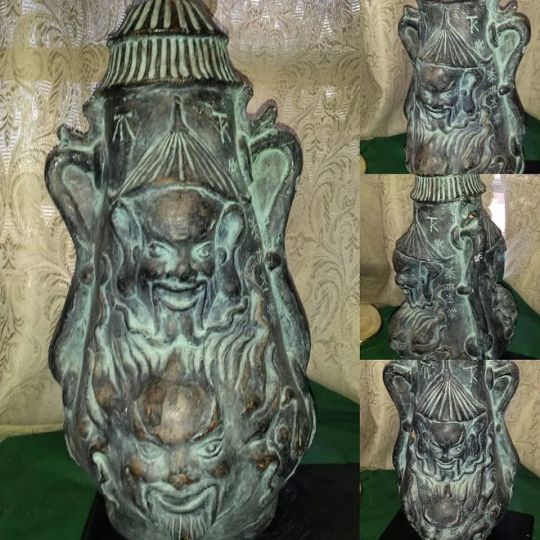
#etsy shop:Red pottery,Green Glaze Vase #art #valentinesday #pottery #japanese #potterygreenglaze #dainipponkutani #dainipponpottery #kutanigreatjapan #dainippon #nineteenthcentury #japanese #faces #redpottery #antique #artdeco #artwork #artist #green #entryway #expressionist #easter #beautiful #fashion #love #mothersday #dwedgecreations.etsy.com #fathersday https://etsy.me/3jDXimD https://www.instagram.com/p/CoYL707pmM-/?igshid=NGJjMDIxMWI=
#etsy#art#valentinesday#pottery#japanese#potterygreenglaze#dainipponkutani#dainipponpottery#kutanigreatjapan#dainippon#nineteenthcentury#faces#redpottery#antique#artdeco#artwork#artist#green#entryway#expressionist#easter#beautiful#fashion#love#mothersday#dwedgecreations#fathersday
0 notes
Text
Translation: Heterodoxy Pamphlet. Music Writers Reflect on 20 Years of the GazettE, Part 1/6 (2002-2004)
Hello friends! As promised long long ago, I'm starting the Heterodoxy series where music writers reflect on their work with the band in the last 20 years. This might take some time since not all the texts are ready just yet, but I will do my best to finish them as quickly as I can. This is Part 1/6, hope you enjoy it!
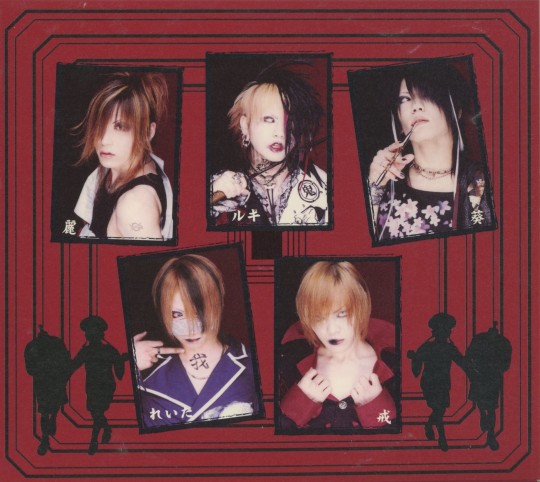
scan credit: @rad-is-more
Text by Hiroko Yamamoto [1]
the GazettE was born in March 2002. The band was formed by Uruha and Reita, who were dear friends from elementary school, Ruki, who they crossed in the previous band (back when he was a drummer) and who later changed to vocals, and their first drummer, Yune, who also invited his buddy from a previous band, Aoi. Two months later, they played their first show at Meguro Rokumeikan, a live venue that can be described as a gateway to success for visual kei bands. Their first maxi single "Wakaremichi" has a melancholic, catchy melody and an impressive fast-paced sound. During the encore of their 20th anniversary live at Yoyogi National Gymnasium in March this year, Ruki looked back on the beginning of the band: "We are the GazettE, and 20 years ago we got together thinking this would be the last band of our lifetimes”. It was during those young days when the band was standing on the stage with recklessness and foolhardiness when such strong headbanging songs as “Kantou Dogeza Kumiai” and “Waifu” were created, yet they continue to stay popular to this day. The band's forward momentum is best represented by the time when they had to play “Kantou Dogeza Kumiai” over and over again because they didn’t have many original songs yet. While they were firing the audience up with their so-called "violent songs", they also had an amazing ability to write emotionally rich compositions with Showa-inspired melodies, such as "Juunanasai" (later included in the pamphlet with CD for their first Nippon Budokan concert). Everything in the GazettE of those early days, up to their make-up and costumes, was elusive and funny in a good way, as conveyed by "Sentimental na Onigokko", a song about bullying, which presents the listeners with a droll world view of a locked room.
The band’s first turning point came the following year. In 2003, when their first drummer left the band, Kai, with whom they had played together in session shows, quickly took his place. This made the current five members, and the band moved to a new office. It was Ruki who made a last-minute call to Kai, and the drummer had to join in right from the next day's show. From this point on the band’s rapid progress officially began. the GazettE of those times actively participated in organized taiban [2] events. They were even nicknamed “taiban killers”, as their heat-packed shows helped them steal away fans who had come to see other bands. In the next three months they released three consecutive four-track mini-albums, "COCKAYNE SOUP", "Akuyuukai" and "Spermargarita", which increased the number of their fans in geometrical progression. Incidentally, at the time they called themselves "Dai Nippon Itan Geisha Gazetto" [3]. The name derived from the thought of what the word “Visual Kei” would sound like if it was a Japanese word [4]. On their 15th anniversary in 2017, the band held a concept show at the Yoyogi National Stadium. On that stage today's the GazettE performed songs from the Dainippon Itan Geisha era, so hopefully fans who didn’t know their early days got to know them. The sense of unity between band and fans that rose steam from the live house, the "Jump to us!" screams, and the band's stage presence all developed during that exact period. Back in September of 2003, the band sold out a two-day one-man show at Takadanobaba AREA, and only four months later, in January 2004, their one-man show "JUDGMENT DAY" at SHIBUYA-AX was sold out. On the day of the show, the venue was overflowing with fans, and the venue’s doors were barely closing. The band was not informed that the tickets had been sold out until the day of the show, and how they were surprised by the scenery in front of them and the crowd’s enthusiasm almost seems funny today.
Particular about every aspect of their performances, videos, sets, playing their music live, even coming up with their own ideas for photoshoots and never stopping the work until they are satisfied – this is the GazettE. When I was covering them in a magazine for the first time, I felt that a band of an entirely new generation that took over from the royalty of Visual Kei (although there was no such term back in the day) had entered the scene. I remembered their down-to-earth attitude, in which the live show and the fans who attend it are the most important thing. I also remembered that young the GazettE had a simple goal of keeping the band going, rather than becoming a band that was listened to by a certain number of people. Come to think of it, that hasn’t changed a bit. Truly an ironclad band.

[1] Hiroko Yamamoto / Born in Tokyo. Impacted by glam and punk rock as well as blues in her college days, she started a band and spent her life immersed in music. After working for an entertainment editorial production, she became a freelance writer. She covered the GazettE for the free papers and visual-kei specific magazines like Neo Genesis. She was particularly impressed by the band’s stance with its emphasis on live performances and believing in their music and their fans without being influenced by trends or critical opinions. Currently writes columns on music, as well as films and doramas. (From the pamphlet’s credits)
[2] 対バン (taiban) - A live with several bands performing. Usually those are beginner bands that split the venue and equipment rent as well as other costs.
[3] 大日本異端芸者 (Dai Nippon Itan Geisha) can be translated as “Heretic people of art (professional performers) of the Great Japan”. We know Ruki never chooses names for anything without putting a lot of meaning into it, and I’d say there are many layers to this title as well.
大日本 (Dai Nippon) initially referrs to the Japanese Empire (大日本帝國 Dai Nippon Teikoku, 1868–1947), which embraced the Meiji, Taishō and Shōwa eras in Japanese history, though nowadays it is considered a nationalistic way of referring to Japan. Dai Nippon expressed the overall aesthetics that the GazettE (then - Gazetto) was working with at the time: Japanese flags on the Wakaremichi cover, the silhouettes of children wearing Imperial Japan school uniforms on the COCKAYNE SOUP cover, lyrics (Oni no men) and the use of traditional melodies (Back Drop Junkie [Nancy]), their iconic indie photoshoots with lots of elements clearly inspired by Japanese culture and so on.
異端 (itan) means heresy. This word is also clearly important for the GazettE’s vision and positioning since we see it literally everywhere: in the fanclub name, 20th anniversary live name, merch etc. If we look up the meaning of the word “heresy”, we’ll see the following: “an opinion profoundly at odds with what is generally accepted”. Not only “being profoundly different” is a key principle of Visual Kei, it is also one of the grounds the GazettE exists and continues to work on.
Finally, 芸者 (geisha, “a person of art”) is a pretty well-known word internationally. While most people associate geisha with professional female performers, the Japanese word itself doesn’t have any gender markers, and the first geisha, which appeared around the first half of the 18th century, were actually male. At the same time, it might refer to the androgynous nature of Visual Kei.
[4] “Visual Kei” is partially a gairaigo — a word that came from a foreign language. The question they asked themselves was “if the concept of v-kei had to be translated through the prism of Japanese culture and values, what would a Japanese word describing it sound like?” And the answer is, apparently, “heretic people of art”.
58 notes
·
View notes
Text
Black B- PASS- Special Issue - The GazettE - NINTH Reference book - (part 1 - the 5 members solo interviews)
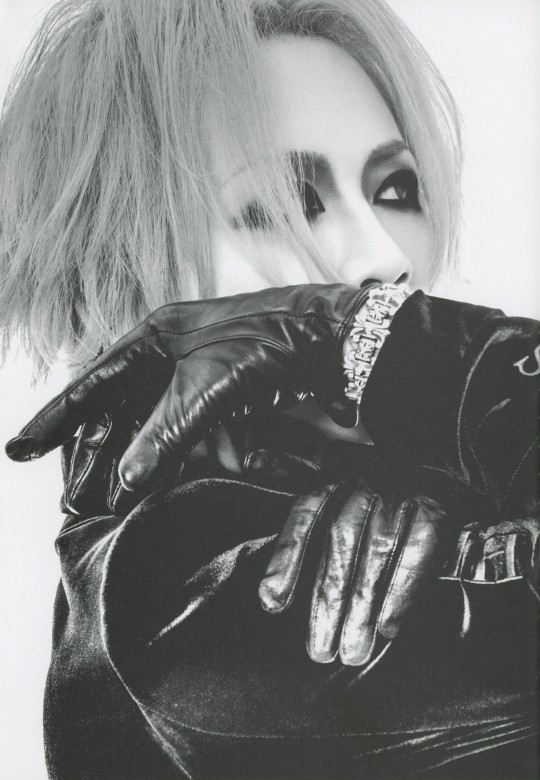
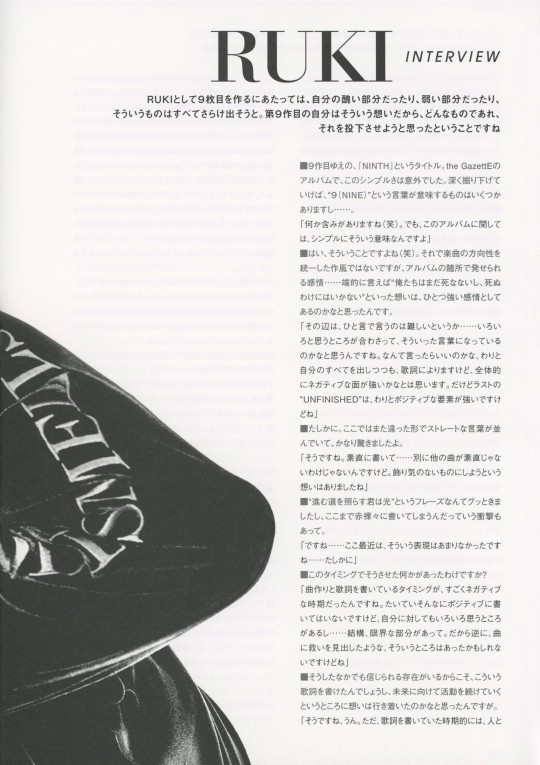
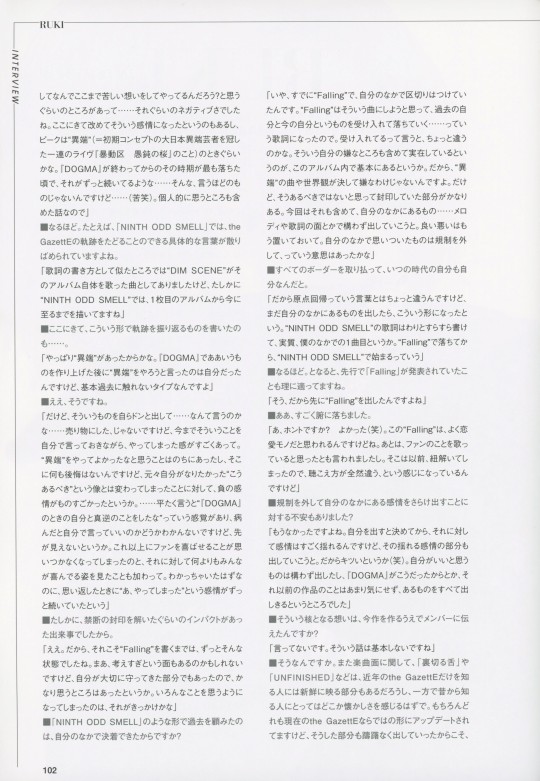
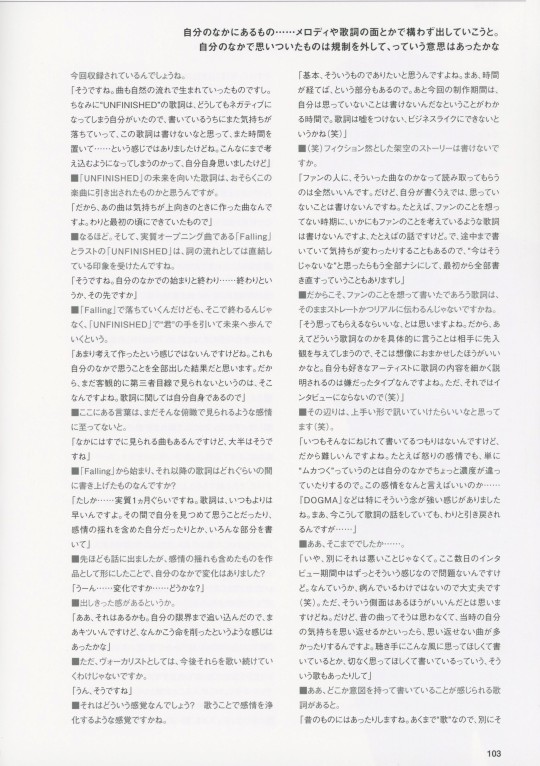
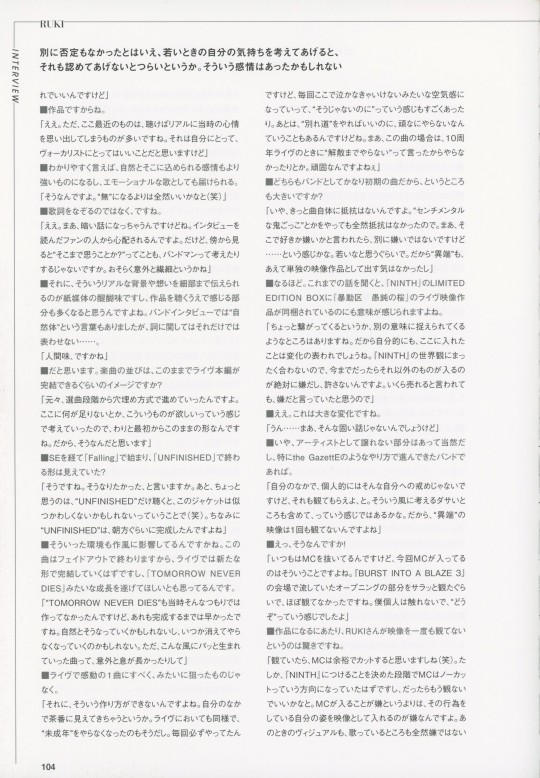
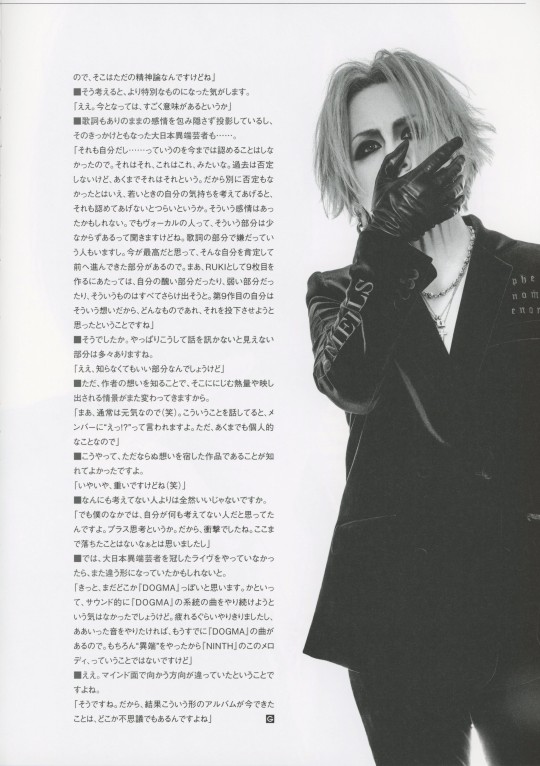
■ Interviewer: The title "NINTH" is quite simple, which is unexpected for a the GazettE album. Delving deeper, there are various meanings that the number "9" can imply...
RUKI: There might be some underlying meanings (laughs). But for this album, it’s simply just that.
■ Interviewer: Right, I see (laughs). The album doesn't have a unified musical direction, but there are strong emotions throughout. To put it simply, it's a strong feeling of 'We are not dead yet, and we can't afford to die.' Do you think that's a strong sentiment in this album?
RUKI: It's hard to explain in one word... I think a lot of different thoughts come together to form that kind of message. How should I put it. While I'm expressing all of myself, the lyrics overall might have a stronger negative aspect. However, the last track, "UNFINISHED," is relatively more positive.
■ Interviewer: Certainly. The straightforward words in that track were quite surprising.
RUKI: Yes, I wrote it honestly... Not that the other songs aren't honest, but I wanted to make it unembellished.
■ Interviewer: The phrase "You are the light that illuminates the path" was very moving and shocking in its naked honesty.
RUKI: Yes... recently, I haven't used such expressions... indeed.
■ Interviewer: Was there something specific that made you write like this at this time?
RUKI: The timing of making the songs and writing the lyrics was during a very negative period. Usually, I don’t write very positively, but I had a lot of thoughts about myself... I was quite at my limit. So maybe, on the contrary, I found salvation in the songs.
■ Interviewer: Despite everything, you could write these lyrics because you had someone to believe in, and your thoughts turned to continuing your activities towards the future, is that right?
RUKI: Yeah, that's right. But at the time I was writing the lyrics, I was wondering why I was putting myself through such pain… It was that kind of negativity. Revisiting those emotions at this point and reflecting on them again… The peak of it was around "itan" (referring to the series of live performances titled "Boudouku Gudon no Sakura" with the initial concept of Dainippon Itan Geisha). The period right after "DOGMA" ended was the lowest, and it feels like that has continued ever since… It's not as serious as it sounds (laughs). This is just my personal perspective.
■ Interviewer: I see. For example, in "NINTH ODD SMELL," there are specific words scattered throughout that trace the history of the GazettE.
RUKI: The way I wrote the lyrics is similar to "DIM SCENE," which was a song that sang about the album itself. But indeed, "NINTH ODD SMELL" depicts everything from our first album to the present.
■ Interviewer: Writing about the band's history in this way, at this time...
RUKI: It was probably because of "itan." After creating something like "DOGMA," I suggested doing "itan," but I'm usually the type not to touch on the past.
■ Interviewer: Yes, that's true.
RUKI: But I deliberately brought it out... How should I put it... I turned it into a product. I always said I wouldn't do that, but I did. In hindsight, I'm glad we did "itan," and I have no regrets about it, but it changed from the ideal I initially had for myself. The negative feelings about that were overwhelming. To put it bluntly, I did something completely opposite to my 'DOGMA' self, I'm not sure if I can say I was in a state of depression, but I felt like I couldn't see the way forward. I couldn't think of anything that would please the fans more than this, and seeing everyone happy about it made it worse. Even though I should have known better, in retrospect, I had this feeling of "Oh, I've done it."
■ Interviewer: It was indeed a significant event, like breaking a forbidden seal.
RUKI: Yes. That's why I remained in that state until I wrote "Falling." Maybe I overthought it, but it was something I had carefully protected, so I had a lot of thoughts about it. That was the trigger that made me start thinking about various things.
■ Interviewer: Did looking back on the past in "NINTH ODD SMELL" mean you had come to terms with it?
RUKI: No, I had already found closure with "Falling." I intended for "Falling" to be a song where I accept both my past and present self and fall... The lyrics reflect that. Saying I accepted it might not be quite right. The idea that even the parts of myself I dislike exist is a fundamental concept in this album. So, it's not that I dislike the songs or the world of "itan." But there were many parts that I thought shouldn't be, which I had sealed away. This time, I included everything in me… melodies, lyrics, without caring about good or bad. I had the intention to unleash what came to my mind without any restrictions."
■ Interviewer: You removed all boundaries and embraced yourself from any era.
RUKI: So, it's a bit different from the term "returning to the roots," but when I released what was still within me, it took this shape. The lyrics for "NINTH ODD SMELL" flowed quite smoothly, and in a sense, it was the first song for me. After falling with "Falling," "NINTH ODD SMELL" begins.
■ Interviewer: I see. That makes sense why "Falling" was released first.
RUKI: Yes, that's why "Falling" was released first.
■ Interviewer: Ah, that makes perfect sense.
RUKI: Oh, really? I'm glad (laughs). "Falling" is often thought of as a love song. I've also been told it sounds like it's about the fans. But I've already unraveled that before, so the way it sounds is different now.
■ Interviewer: Did you have any anxiety about exposing the emotions inside you without restrictions?
RUKI: Not anymore. Once I decided to reveal myself, my emotions swayed a lot, but I decided to express those swaying emotions as well. So, it was tough (laughs). I expressed what I felt was good, without worrying too much about "DOGMA" or previous works. I just wanted to release everything I had.
■ Interviewer: Did you share those core feelings with the members while making this album?
RUKI: No, I didn't. We generally don't have those kinds of discussions.
■ Interviewer: I see. Regarding the musical aspects, songs like "Uragiru Bero" and "UNFINISHED" might feel fresh to those who have only known the recent the GazettE, while they might evoke nostalgia for those who have followed you from the beginning. Of course, all of them are updated to the current the GazettE's style.
RUKI: Yes. The songs came about naturally. By the way, with "UNFINISHED," I found myself becoming negative while writing it. My mood would drop, and I'd feel like I couldn't finish the lyrics, so I'd take a break and come back to it. I realized how deeply I could get lost in thought.
■ Interviewer: The future-oriented lyrics of "UNFINISHED" seem to have been drawn out by the song itself.
RUKI: That's why that song was created when my mood was more positive. It was one of the earlier songs we made.
■ Interviewer: I see. And the opening track "Falling" and the final track "UNFINISHED" seem to have a direct connection in terms of the lyrical flow.
RUKI: Yes. For me, it's the beginning and the end... or rather, what comes after the end.
■ Interviewer: You fall in "Falling," but it's not the end. In "UNFINISHED," you take someone's hand and walk toward the future.
RUKI: It wasn't made with that much thought. It's just the result of expressing everything I felt. That's why I still can't view it objectively, from a third-party perspective. The lyrics are part of me.
■ Interviewer: So the words here aren't emotions you can yet see from a distance.
RUKI: There are some songs I can see that way, but most of them, no.
■ Interviewer: How long did it take to write the lyrics after "Falling"?
RUKI: About a month, I think. It was faster than usual. During that time, I wrote about what I felt while reflecting on myself, including my emotional fluctuations.
■ Interviewer: As we discussed earlier, by shaping your fluctuating emotions into a piece of work, did you experience any changes within yourself?
RUKI: Hmm... changes... I'm not sure.
■ Interviewer: Did you feel a sense of completion?
RUKI: Yes, perhaps. I pushed myself to my limits, so it was tough, but I felt like I had given everything, almost like I had poured my life into it.
■ Interviewer: But as a vocalist, you'll continue singing these songs moving forward, right?
RUKI: Yes, that's right.
■ Interviewer: How does that feel? Is it like purifying your emotions through singing?
RUKI: Ideally, that's what I'd like it to be. Time plays a part in it too. During this production period, I realized that I can't write about things I don't genuinely feel. I can't lie in my lyrics; they can't be business-like (laughs).
■ Interviewer: (Laughs) You can't write fictional, imaginary stories.
RUKI: It's fine if fans interpret it that way. But when I'm writing, I can't write about things I don't feel. For example, if I'm not thinking about the fans at a particular time, I can't write lyrics that seem like I am, hypothetically speaking. If my feelings change halfway through writing, I scrap it and start over.
■ Interviewer: That's why lyrics that you wrote with the fans in mind probably come across as straightforward and real.
RUKI: I'd like to think so. That's why I avoid giving specific explanations about the lyrics to prevent giving preconceived notions. I didn't like it when artists I liked explained their lyrics in detail. But then, it wouldn't be an interview (laughs).
■ Interviewer: I hope to ask in a way that works well (laughs).
RUKI: I don't intend to write in a twisted way, but it's challenging. For example, even with anger, the intensity of the emotion might differ from just being "annoyed." Especially with "DOGMA," the emotions were intense. Even now, talking about lyrics tends to pull me back into those feelings.
■ Interviewer: I see... it was that deep.
RUKI: It's not a bad thing. During this interview period, I've been feeling that way constantly, but it's not like I'm unwell (laughs). It's probably good to have that side. But with older songs, I can't always recall my feelings from that time. There are songs where I wanted listeners to feel a certain way, such as wistful or sorrowful.
■ Interviewer: So there are lyrics that were written with a specific intention.
RUKI: Some older songs have that. But they are just songs. It's not that I deny them, but when I think about my feelings when I was younger, I feel that I need to acknowledge them, or it becomes painful. There might have been such emotions.
■ Interviewer: Because it's a piece of work.
RUKI: Yes. However, with recent works, listening to them brings back my real feelings from that time vividly. I think that's a good thing for me as a vocalist.
■ Interviewer: To put it simply, the emotions embedded naturally become stronger, making it an even more emotional song.
RUKI: Exactly. I think it's much better than becoming numb (laughs).
■ Interviewer: Rather than just tracing the lyrics.
RUKI: Yes. Although, this can make it a bit dark. Fans who read the interviews get worried. But from an outsider's perspective, band members might think, "Do you really feel that deeply?" I suppose we're more delicate than expected.
■ Interviewer: Also, the charm of print media is that it can convey those real backgrounds and feelings in detail, enhancing what you feel when listening to the work. In the band interviews, the word "natural" was mentioned, but for lyrics, it's not just about that...
RUKI: It's about human touch, I guess.
■ Interviewer: I think so too. The arrangement of the songs gives the impression that the live performance could be completed as it is.
RUKI: From the selection stage, we progressed by filling gaps. We considered what was missing or what we wanted, so it has been in this form from the beginning. So, I think that's why.
■ Interviewer: Did you foresee starting with "Falling" after the SE and ending with "UNFINISHED"?
RUKI: Yes, that's what we aimed for. Also, I think that just listening to "UNFINISHED," the cover art might not quite match (laughs). By the way, "UNFINISHED" was completed around dawn.
■ Interviewer: The environment might also influence the style of the song. Since this song ends with a fade-out, it should conclude in a new form during live performances. I hope it will grow like "TOMORROW NEVER DIES."
RUKI: We didn't intend for "TOMORROW NEVER DIES" to be like that at the time, but it was completed quickly. It might naturally evolve or eventually fade away and stop being performed. However, songs that are born so quickly often have long lifespans.
■ Interviewer: It's not about creating a song to be a touching piece for live performances.
RUKI: Also, I can't create songs with that intention. It would feel like a farce to me. The same goes for live performances. For example, we stopped playing "Miseinen" because it felt like I had to cry every time, even if that wasn't the case. Similarly, we don't play "Wakaremichi" even though we could. For instance, during our 10th-anniversary live, we didn't play it because we said we wouldn't until we disbanded. We're stubborn that way.
■ Interviewer: Is it largely because these are some of the band's earliest songs?
RUKI: No, I don't have any resistance to the songs themselves. I had no issue performing "Sentimental na onigokko." It's not that I dislike them. I just feel they’re a bit youthful. So, I didn't intend to release "Itan" as a standalone video work.
■ Interviewer: I see. Listening to what you've said, it feels meaningful that the live footage of "Boudouku Gudon no Sakura" is included in the "NINTH" LIMITED EDITION BOX.
RUKI: It connects in a way and can be seen in a different light. Including it shows a change in me. It doesn’t fit the world of "NINTH" at all, and I used to be adamant about not including unrelated content, no matter how well it might sell.
■ Interviewer: This is a big change.
RUKI: Yeah... it's not that serious of a topic, though.
■ Interviewer: No, it's natural to have non-negotiable aspects as an artist, especially in a band like the GazettE that has moved forward in its own way.
RUKI: For me, it's not about scolding myself but allowing myself to be seen that way. It's about accepting even the uncool parts of myself. That's why I haven't watched the "Itan" footage even once.
■ Interviewer: Really, you haven't?
RUKI: Usually, the MC parts are edited out, but this time they're included. I barely watched the opening part shown at the "BURST INTO A BLAZE 3" event. I left it untouched, letting it be.
■ Interviewer: It's surprising that you didn't watch the footage even once before it became a product.
RUKI: If I had watched it, I would have easily cut the MC parts (laughs). When we decided to include it in "NINTH," we were already planning to leave the MC uncut, so I thought it was better not to watch. It's not that I hate including the MC parts; I just dislike the act of watching myself in that footage. The visuals and singing are fine, so it's just a matter of mindset.
■ Interviewer: Thinking about it that way, it feels like it has become something even more special.
RUKI: Yes. Now, it has a lot of meaning.
■ Interviewer: The lyrics also reflect your genuine emotions without any disguise, and your time with "Dainippon Itan Geisha" played a part in that...
RUKI: That's also part of me. In the past, I didn't acknowledge that. I used to separate it, like, "That was then, and this is now." I didn't deny my past, but I considered it a separate entity. However, when I reflect on my feelings from when I was younger, I realize it would be painful not to acknowledge them. So, I may have had such emotions. But I hear that vocalists often have such feelings to some extent. Some people are even uncomfortable with their own lyrics. Believing that the present is the best and affirming myself, I've moved forward. While creating the ninth album as RUKI, I decided to expose all my ugly and weak parts. For this ninth work, I wanted to express whatever feelings I had, no matter what they were.
■ Interviewer: I see. There are many aspects that become clear only through such discussions.
RUKI: Yes, although there are parts that you probably don’t need to know.
■ Interviewer: However, knowing the author's thoughts can change the perceived intensity and the depicted scenery.
RUKI: Well, I’m usually in good spirits (laughs). When I talk about these things, the members often say, "What!?" But it's a personal thing.
■ Interviewer: I'm glad to know that this work carries such profound feelings.
RUKI: It’s heavy though (laughs).
■ Interviewer: But it's much better than someone who doesn’t think about anything at all.
RUKI: I used to think I was a person who didn’t think about anything. I was more of a positive thinker. So, it was shocking. I had never fallen this deep before.
■ Interviewer: If you hadn’t done a live under the name "Dainippon Itan Geisha," things might have turned out differently.
RUKI: Most likely, it would still be somewhat "DOGMA"-like. Not that I would have wanted to continue with the sound of "DOGMA" indefinitely. We did it so thoroughly that I was exhausted. If I wanted to make music like that, we already have the "DOGMA" songs. Of course, doing "Itan" didn’t directly lead to the melodies in "NINTH."
■ Interviewer: Right. The direction of your mindset would have been different.
RUKI: Exactly. So, it's somewhat mysterious that we ended up with this kind of album now.
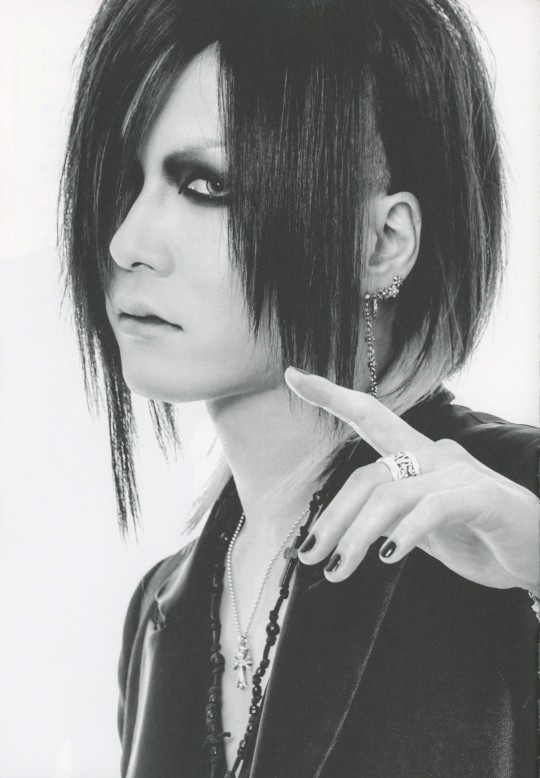

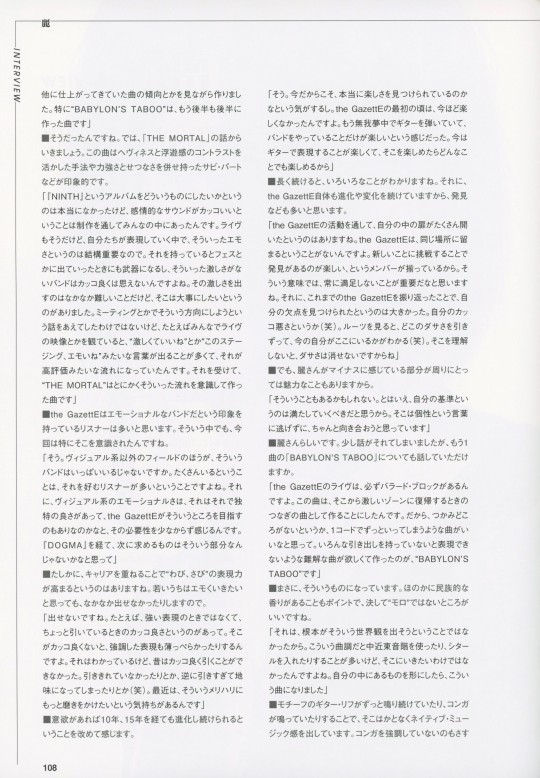
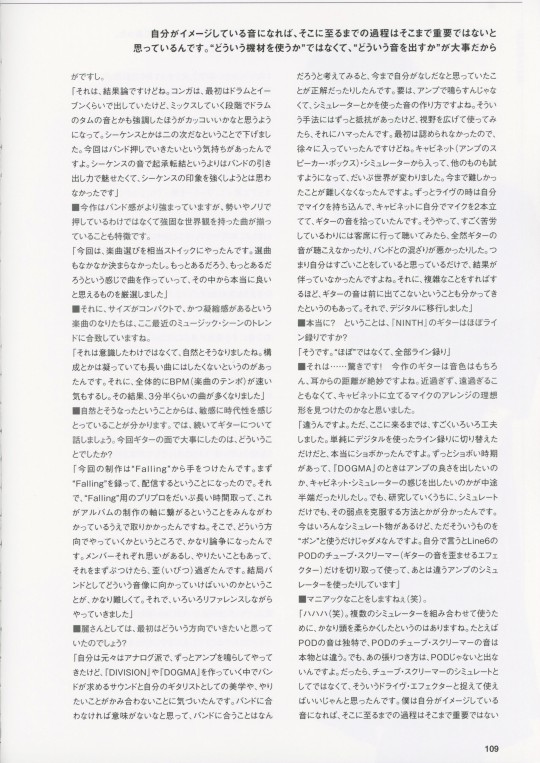
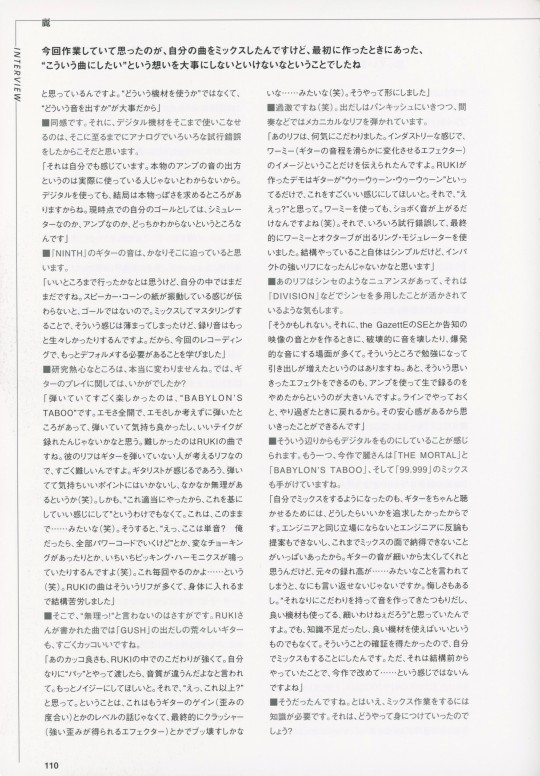
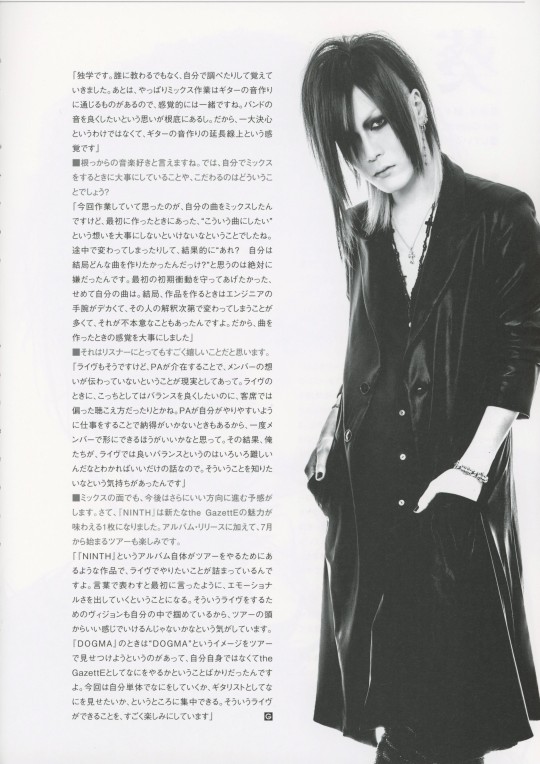
■ Interviewer: Around the time of the release of your previous work "DOGMA," the GazettE had many opportunities to look back on the journey you've taken, such as the "Redefinition Tour," the 13th Anniversary live, and the 15th Anniversary live. What was your mindset before starting the album's production?
Uruha: Really, in these past few years, we've had many projects that involved looking back. Besides what you just mentioned, we also made a ballad best-of album ("TRACES VOL.2," released on March 8, 2017). Reflecting on so much made me realize that I've always been immature as a musician and that I'm still incomplete. Especially when I think about my mindset as a guitarist in the early days, it's at a level where I don't even want to remember it (laughs). The past few years of reflecting have been a period for me to realize that I need to improve more."
■ Interviewer: Your dedication remains unchanged. Amidst such thoughts, you began creating "NINTH," right?
Uruha: Yes. But at that time, we didn't have a clear theme or concept for the album. It was the same with "DOGMA" – RUKI just presented the visual image. This time, it was a picture of a soldier’s face melting, but I couldn't visualize how that would connect musically. In other words, there was no theme or direction when we started making the songs. Having just come out of a period of intense reflection on the past, I personally approached the songwriting process with the question, "Who am I?" in mind. When you keep pushing forward without looking back, sometimes you end up with something that doesn't feel like yourself. I thought that wasn’t good, and if I got too immersed in my current mode, I might overlook my own immaturity. So this time, I wanted to create songs that reflected my core. In that sense, the period of looking back was beneficial.
■ Interviewer: You took a good look at yourself. Listening to the songs you wrote this time, "THE MORTAL" and "BABYLON'S TABOO," it's clear that you like powerful and emotional music.
Uruha: That's definitely true. However, I brought those two songs in fairly late in the production process. So, they weren't born out of the initial inspiration but were created while looking at the trends of the other songs that were already finished. Especially "BABYLON'S TABOO," which was made towards the very end."
■ Interviewer: I see. Let’s start with talking about "THE MORTAL." This song is impressive for its method of utilizing the contrast between heaviness and a sense of floating, as well as its chorus that combines strength and sadness.
Uruha: "While we didn’t have a clear vision of what we wanted the album "NINTH" to be, we all agreed through the production process that an emotional sound is cool. This is important not only in live performances but also in our overall expression. Having that kind of emotional intensity can be a weapon when performing at festivals and such. Bands that lack this intensity don't seem cool to me. It's quite challenging to bring out this intensity, but we wanted to cherish that aspect. We didn’t explicitly decide to go in that direction during meetings, but when we watched live footage together, comments like 'This staging is intense and great' or 'It's emotional' came up often, and that became a sort of positive feedback loop. With that in mind, I created "THE MORTAL" very consciously following that trend."
■ Interviewer: I think many listeners perceive the GazettE as an emotional band. This time, you were especially conscious of that, right?
Uruha: "Yes. There are many bands outside of the visual kei field that have this emotional aspect. Since there are so many, it means there are many listeners who appreciate that style. Also, the emotional quality of visual kei has its own unique appeal, and I feel it's necessary for the GazettE to aim for that. After "DOGMA," I thought that the next thing we should seek is that kind of emotional quality."
■ Interviewer: Indeed, as you gain more experience, your ability to express "wabi-sabi" (aesthetic of beauty in imperfection) increases. When you are young, even if you want to be emotional, it's hard to express it well.
Uruha: "It’s hard to express. For example, there's a certain coolness in being subtle rather than expressing something strongly. If that's not cool, even emphasized expressions become superficial. Although I understood this, I couldn't achieve it well in the past. Either I couldn't be subtle enough, or I became too subdued and boring (laughs). Recently, I feel the urge to refine that contrast even more."
■ Interviewer: It's inspiring to see that with ambition, one can continue to evolve even after 10 or 15 years.
Uruha: "Yes. Now, more than ever, I feel like I've truly found joy. In the early days of the GazettE, it wasn’t as fun as it is now. Back then, I was just playing guitar with all my might, and the only fun part was being in a band. Now, expressing myself through the guitar is enjoyable, and when I can enjoy that, I can enjoy anything."
■ Interviewer: Over a long period, you understand many things. Additionally, the GazettE itself continues to evolve and change, leading to many discoveries.
Uruha: "Through the activities of the GazettE, many doors within myself have opened. The GazettE never stays in one place. The members enjoy discovering new things by challenging themselves, which is why not being satisfied is important. Also, looking back at the GazettE’s history helped me identify my flaws. My uncool aspects (laughs). By examining my roots, I see where I’ve carried that tackiness to my current self (laughs). If I don’t understand that, I can’t get rid of it."
■ Interviewer: But, the parts you feel are negative might be attractive to others.
Uruha: "That could be true. However, I think I should meet my own standards. Instead of using the word 'personality' as an excuse, I want to confront it properly."
■ Interviewer: That sounds like you. We got a bit sidetracked, but could you talk about the other song, "BABYLON'S TABOO"?
Uruha: "In GazettE's live shows, there's always a ballad block. This song was made as a transition piece to return to the intense zone from that ballad block. So, I thought it would be good to have a song that is continuous and elusive, like a one-chord song. "BABYLON'S TABOO" was created because I wanted a complex song that requires various skills to express."
■ Interviewer: Indeed, it turned out to be just that. It also has a subtle ethnic flavor, and it's nice that it's not too obvious.
Uruha: "That’s because the underlying concept wasn’t to bring out that world view. With this kind of musical style, it’s common to use Middle Eastern scales or incorporate sitars, but that’s not where I wanted to go. When I shaped what was inside me, it turned into this kind of song."
■ Interviewer: The continuous guitar riff and congas create a subtle native music feel. The fact that the congas aren’t overly emphasized is also great.
Uruha: "That's hindsight though. Initially, the conga was produced at the same level as the drums, but during the mixing stage, I thought it would be cooler to emphasize the sound of the drum toms. I decided to prioritize downgrading the sequences, thinking they were secondary. This time, I wanted to focus more on the band. Instead of emphasizing the sequence's impression in terms of development, I wanted to showcase the band's pulling power and didn't aim to strengthen the sequence's impact."
■ Interviewer: This work has a stronger band feel, but it’s characterized by songs with a solid worldview, not just driven by momentum or groove.
Uruha: "This time, we were extremely strict in our song selection. It took a while to finalize the selection. We kept creating songs, thinking there must be more, and we meticulously selected the ones we truly believed were the best."
■ Interviewer: The songs are compact and dense, matching the recent trends in the music scene.
Uruha: "It wasn’t intentional; it just happened naturally. Even if the structure is elaborate, we didn’t want long songs. Also, the overall BPM (tempo) feels fast, resulting in many songs around three and a half minutes long."
■ Interviewer: The fact that it happened naturally indicates a sensitivity to the times. Let's talk about the guitar next. What was important for you in terms of the guitar in this production?
Uruha: "We started the production with "Falling." First, we recorded "Falling" and decided to release it digitally. We spent a long time on the pre-production for "Falling," knowing it would set the tone for the album. There was significant debate about the direction we should take. Each member had their own ideas and desires, and when we combined them, it turned out to be too distorted. It was quite challenging to figure out the band’s sound. We used various references to guide us."
■ Interviewer: What direction did you initially want to take?
Uruha: "I originally preferred analog and had always used amps. However, while making "DIVISION" and "DOGMA," I realized that my personal aesthetics and desires as a guitarist didn’t always align with the band's sound. If it didn’t fit the band, it was meaningless. So, I considered what would suit the band and found that the things I had dismissed were actually the right answer. Basically, instead of using amps, I started using simulators to create the sound. Although I had resisted this method, when I tried it with an open mind, it fit well. Initially, I couldn't accept it, so I gradually adopted it. I started with cabinet (amp speaker box) simulators, then tried other things, and my world changed significantly. Things that were difficult before became easier. During live shows, I used to bring my own mics, set up two mics on the cabinet to capture the guitar sound. Despite my efforts, the guitar sound wasn’t heard well from the audience, and it didn’t blend well with the band. I realized I was only thinking I was doing something great without achieving the desired result. The more complex the setup, the less the guitar sound stood out. That led me to go digital."
■ Interviewer: Really? Does that mean the guitar on "NINTH" is mostly line recording?
Uruha: "Yes, not 'mostly,' but entirely line recording."
■ Interviewer: That's... surprising! The guitar on this work has a perfect distance from the ear, not too close nor too far. I thought you had found the ideal microphone arrangement for the cabinet.
Uruha: "That’s not the case. I experimented a lot to get here. Simply switching to digital line recording was really lackluster at first. It was lackluster for a long time. During "DOGMA," I couldn’t decide whether to bring out the amp's qualities or the cabinet simulator feel. But through research, I learned how to overcome the weaknesses of simulation. Now there are various simulators, but you can’t just use them as they are. For instance, I use only the Tube Screamer effect from Line6’s POD, and pair it with a different amp simulator."
■ Interviewer: That’s quite technical (laughs).
Uruha: "Hahaha (laughs). Using multiple simulators required a flexible mindset. For example, the POD has a unique sound; the Tube Screamer effect from POD is different from the real thing. However, that distinctive clinginess is only possible with POD. So, instead of seeing it as a Tube Screamer simulation, I started using it as a drive effect. I believe that if the sound matches my vision, the process doesn’t matter much. During this work, I realized that it's essential to cherish the initial vision for a song. It’s not about what equipment you use but the sound you create."
■ Interviewer: I agree. I think being able to use digital equipment so proficiently comes from all the analog trial and error you went through to get here.
Uruha: "I feel that too. You can’t understand the sound of a real amp unless you’ve actually used one. Even when using digital equipment, in the end, we still seek a sense of authenticity. My current goal is to reach a point where you can’t tell if it’s a simulator or a real amp."
■ Interviewer: The guitar sound on "NINTH" gets very close to that.
Uruha: "I think we got pretty close, but I still feel there's a long way to go. If you don’t feel the paper cone of the speaker vibrating, then it’s not the goal. Mixing and mastering diluted that raw feeling, but the recorded sound was more vivid. So, through this recording process, I learned that it’s necessary to exaggerate certain aspects more."
■ Interviewer: Your dedication to research hasn't changed at all. How about your guitar playing?
Uruha: "The song that was really fun to play was 'BABYLON'S TABOO.' It was full of emotion, and there were times when I played without thinking about anything other than emotion, and I think we recorded a good take. The difficult ones were RUKI’s songs. His riffs are designed by someone who doesn’t play guitar, making them very challenging. They don’t hit the sweet spots that guitarists usually enjoy; they’re quite demanding (laughs). Also, it’s not like he says, ‘I did this casually, make it sound good based on that.’ He wants it just as it is (laughs). So I’d be like, ‘Wait, this part is single notes? I’d use power chords for all of it.’ There’d be weird bends or sudden picking harmonics (laughs). And I’d think, ‘Do I have to do this every time?’ (laughs). RUKI’s songs have a lot of riffs like that, so it took quite a bit of effort to internalize them."
■ Interviewer: So, it's impressive that you don’t say "impossible" to that. In the song written by RUKI, the rough guitar intro of "GUSH" is really cool, isn’t it?
Uruha: "Yeah, that coolness comes from RUKI's strong commitment. I did it quickly on my own and handed it over, but he said the sound quality was different. He wanted it to be more noisy. So I was like, 'Huh, even more?' (laughs). That meant it wasn't just a matter of guitar gain levels anymore; it ended up being crushed with a crusher (an effect that gives strong distortion), like 'There's no choice but to destroy it completely' (laughs). That's how we shaped it."
■ Interviewer: Quite extreme (laughs). The beginning goes punkish, but you're playing mechanical riffs in the interlude, right?
Uruha: "I actually put a lot of effort into those riffs. It had an industrial feel, conveyed only with the image of a whammy (an effect that smoothly changes the pitch of the guitar). RUKI's demo had the guitar going 'wooooon wooooon' only, and he wanted it to sound really good. So I was like, 'Huh?' (laughs). Even with the whammy, the sound just gets lame (laughs). So, after a lot of trial and error, we finally used a ring modulator that produces whammy and octave effects. It's quite simple in terms of what we did, but I think it turned into a riff with a strong impact."
■ Interviewer: That riff has a nuance like a synthesizer, which seems to leverage your use of synths in albums like "DIVISION."
Uruha: "That could be true. Also, when creating sounds for the GazettE's SE, there were many scenes where I destructively broke the sound or made explosive noises. I learned a lot from that, it has expanded my repertoire. Another thing is that stopping recording live amps and doing it through a line allows you to revert when you go too far. That sense of security enables us to boldly try things."
■ Interviewer: From those aspects, one can feel that you've really mastered digital equipment. Another thing, on this album, you handled the mixing for "THE MORTAL," "BABYLON'S TABOO," and also "99.999," right?
Uruha: "Yeah, I started mixing myself because I wanted to figure out how to properly showcase the guitar. If I didn't put myself in the position of an engineer, I couldn't argue or suggest anything to them. There were a lot of things about the mix that I wasn't satisfied with before. Like, I'd think the guitar sound was thin and wanted it thicker, but then they'd say, 'The original recording height...' It was frustrating, you know? I thought, 'I've put in a reasonable amount of effort and used good equipment, so it shouldn't sound thin.' But I lacked knowledge, and it wasn't just about using good equipment. I wanted that assurance, so I decided to mix it myself. However, I've been doing this for quite some time, so it wasn't like I started anew for this album."
■ Interviewer: I see. However, you need knowledge to do mixing work. How did you go about acquiring that?
Uruha: "I'm self-taught. I didn't learn from anyone; I researched and learned on my own. Also, mixing work is somewhat related to creating guitar sounds, so it's similar in feeling. There's a desire to improve the band's sound. So, rather than a major decision, it feels like an extension of creating guitar sounds."
■ Interviewer: You can tell you're a genuine music lover. So, what do you focus on and value when mixing your own tracks?
Uruha: "During this work, I realized that when I mix my own songs, I need to cherish the initial feeling of 'I want this song to be like this' that I had when I first created it. I absolutely hate it when it changes midway and I end up thinking, 'Wait, what kind of song did I want to make again?' I wanted to protect that initial impulse, at least for my own songs. Ultimately, when making a piece of work, the skill of an engineer can greatly influence and change it, sometimes against my wishes. So, I focused on preserving the original feeling when I made the song."
■ Interviewer: I think that's something listeners will really appreciate.
Uruha: "It's the same with live performances—when the PA gets involved, the members' intentions don't always get conveyed accurately. Even if we want to balance things well, sometimes the audience hears it in a skewed way because the PA is working to make their job easier. It’s better if the band can shape the sound themselves. If we understand the difficulty of achieving a good balance live, that's just part of the process. I wanted to know more about these aspects."
■ Interviewer: It seems like your mixes will keep improving. Now, "NINTH" has become an album showcasing new charms of the GazettE. Along with the album release, we’re also looking forward to the tour starting in July.
Uruha: "The album 'NINTH' is a work designed for the tour, packed with things we want to do live. As I mentioned before, it's about bringing out that emotional aspect. I have a clear vision for this kind of live performance, so I think we can start the tour on a strong note. With 'DOGMA,' the goal was to present the image of 'DOGMA' on tour, focusing on what the GazettE would do rather than on myself. This time, I can concentrate on what I want to do individually and what I want to show as a guitarist. I'm really looking forward to delivering that kind of live performance."
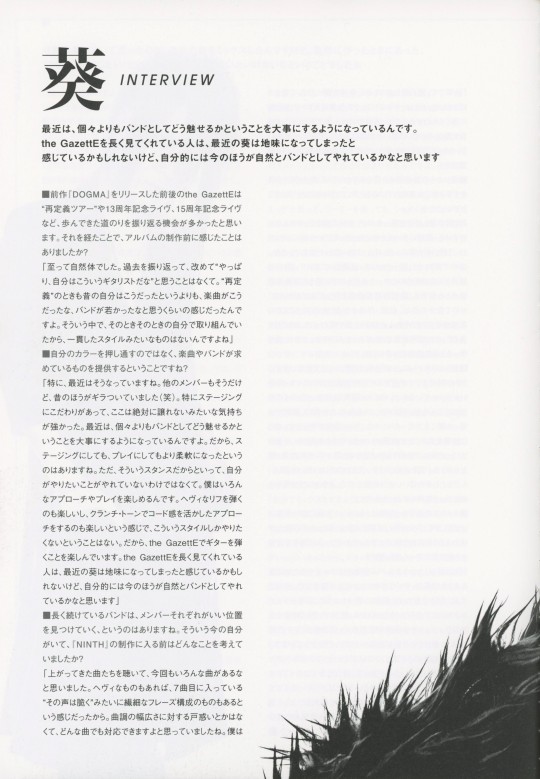
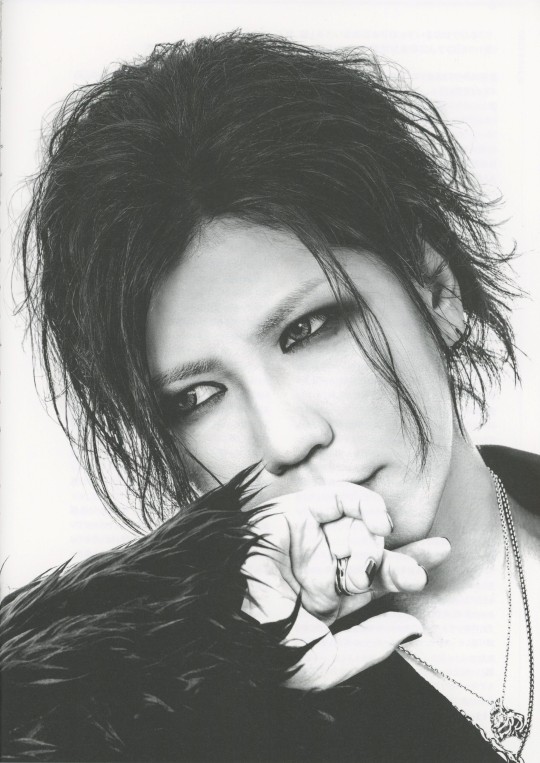
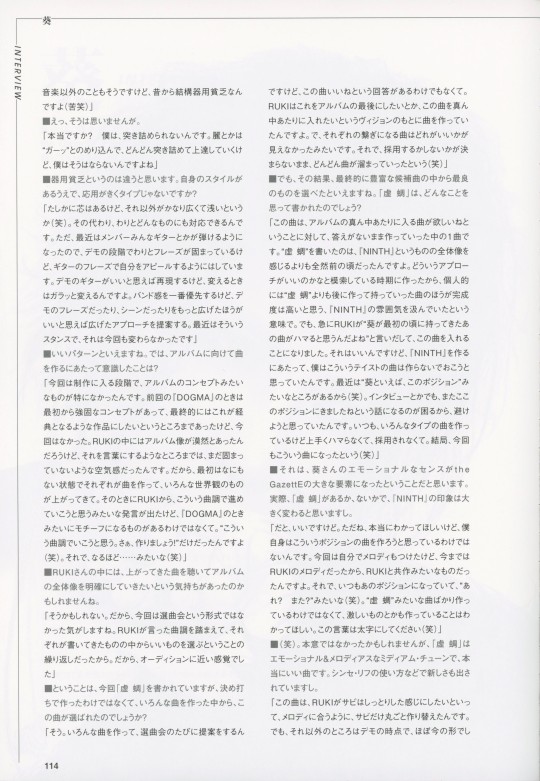
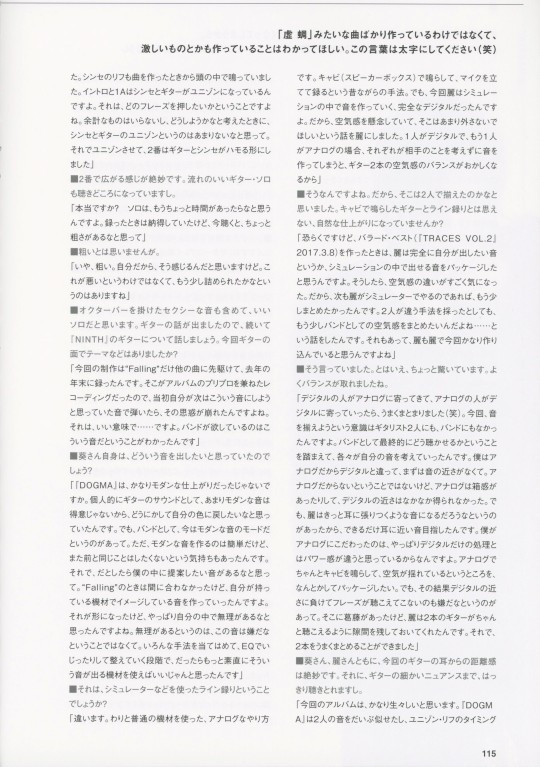
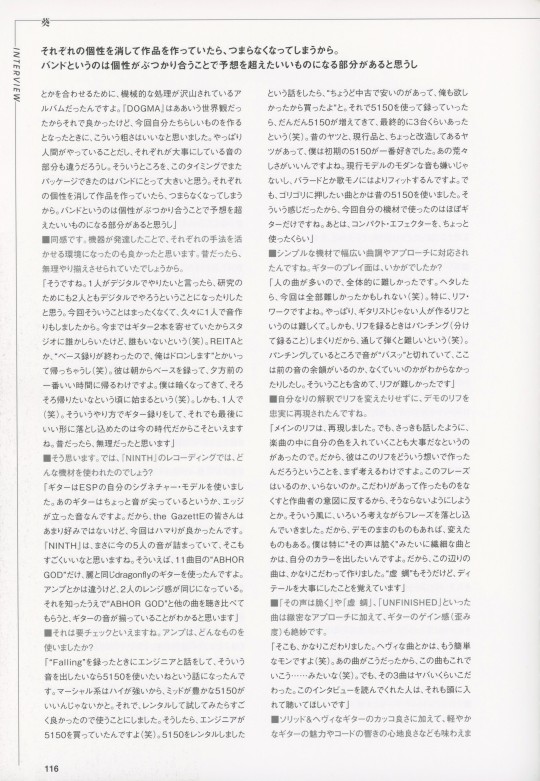
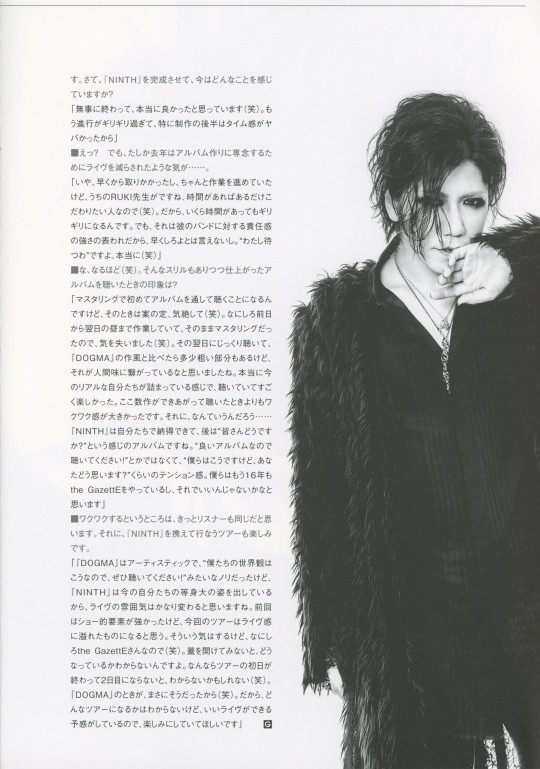
■ Interviewer: Around the release of your previous album "DOGMA," the GazettE had many opportunities to reflect on its journey with the "Redefinition tour," the 13th-anniversary live, and the 15th-anniversary live. Did this influence how you felt before starting the new album?
Aoi: "It was quite natural. Looking back at the past, I didn't have a moment where I thought, 'Yes, I'm definitely this kind of guitarist.' Even during the 'redefinition' phase, it wasn't so much about how I was back then but more about the songs and the youthfulness of the band. In that context, I was always working as my current self at the time, so there's no consistent style."
■ Interviewer: So, it's more about providing what the songs and the band need rather than asserting your own style?
Aoi: "Especially recently, yes. Although the other members are like that too, in the past, I was more intense (laughs). I had a strong attachment to staging, certain things were absolutely non-negotiable. Nowadays, we focus more on how to present ourselves as a band rather than as individuals. So, both in staging and playing, I've become more flexible. However, this doesn't mean I can't do what I want. I enjoy various approaches and playing styles. Playing heavy riffs is fun, and so is using crunch tones to bring out the chords. There’s nothing I don’t want to do style-wise. So, I really enjoy playing guitar in the GazettE. Long-time fans might think Aoi has become more subdued lately, but I feel more naturally part of the band now."
■ Interviewer: In long-lasting bands, members often find the right position for themselves. With this mindset, what were your thoughts going into the creation of "NINTH"?
Aoi: "When I listened to the submitted songs, I thought there was a lot of variety again. There were heavy songs, and delicate ones like the seventh track, 'その声は脆く' (Sonokoe wa Moroku). I wasn't confused by the variety; I felt ready to handle any song. I’ve always been something of a jack-of-all-trades, even outside of music (laughs)."
■ Interviewer: Really? I don't see it that way.
Aoi: "Is that so? I feel I can't dive deep into things. Uruha, for example, dives headfirst into things and steadily improves, but I'm not like that."
■ Interviewer: I don't think being versatile is the same as being a jack of all trades. You have your own style, and you're the type who can apply it in various situations, right?
Aoi: "True, I have a core, but everything else is quite broad and shallow (laughs). As a trade-off, though, I can adapt to almost anything. Lately, all the members have become capable of playing guitar, so during the demo stage, the phrases are often already solidified. Still, I make sure to assert myself with the guitar phrases. If I think the demo's guitar phrase is good, I'll reproduce it, but when I change it, I change it completely. Band cohesion is my top priority, but if I feel it's better to expand the demo phrase or the scene, I'll suggest a broader approach. That’s been my stance recently, and it hasn’t changed this time either."
■ Interviewer: That seems like a good approach. When creating songs for the album, what did you focus on?
Aoi: "This time, we didn’t have a specific concept for the album when we started. With "DOGMA," we had a strong concept from the beginning, aiming to create a work that would become like a scripture. But this time, we didn’t have that. RUKI probably had a vague idea of the album, but it wasn’t solidified enough to put into words. So, at first, we just started making songs individually, and various worldviews emerged. When RUKI mentioned a direction for the songs, it wasn’t a motif like in "DOGMA." It was more like, ‘Let’s proceed with this musical style.’ So, we started creating with just that direction in mind (laughs)."
■ Interviewer: Perhaps RUKI wanted to clarify the overall vision of the album by listening to the submitted songs.
Aoi: "Maybe so. That's why this time it didn't feel like a selection meeting in the traditional sense. It was more about building upon the musical direction Ruki had mentioned and choosing the best among what each of us had written. So, it felt like an audition in a way."
■ Interviewer: So, regarding the song Utsusemi, was it chosen from various songs you made, not something you created with a fixed decision?
Aoi: "Yes. I made many songs and proposed them at each selection meeting, but there wasn’t a direct response like, ‘This song is good.’ RUKI created songs with a vision of wanting this one at the end of the album or this one in the middle. He couldn’t see which songs would connect well. As a result, the songs kept piling up without deciding whether to adopt them or not (laughs)."
■ Interviewer: But in the end, you could choose the best from a rich pool of candidate songs. What was your thought process in writing Utsusemi?
Aoi: "This song was one of those created without a clear answer to the need for a mid-album track. I wrote Utsusemi long before I had a clear vision of "NINTH." I was still exploring how to approach it, so personally, I think the songs I made after Utsusemi are more complete, reflecting the atmosphere of "NINTH." But suddenly, RUKI started saying he thought that song I had brought in at the beginning would fit well, and that's how this song got included. That's all good, but when it came to making 'NINTH,' I had thought to avoid making songs of this type. There’s this perception of ‘this is Aoi's position’ (laughs). Even in interviews, it becomes a topic, and I wanted to avoid that. I always create various types of songs, but they often don’t fit and aren’t adopted. In the end, it turned out to be a song like this again this time (laughs)."
■ Interviewer: That’s because your emotional sense is a significant element of the GazettE. Whether Utsusemi is included or not greatly affects the impression of "NINTH."
Aoi: "I hope so. But honestly, I want people to understand that I don't intend to create songs of this position. This time, I came up with the melody myself, but until now, it was Ruki's melodies, so it was like a collaboration with Ruki. It always ends up in that position, like, 'Huh? Again?' (laughs). I want people to know that I also create intense songs, not just songs like Utsusemi. Please make this sentence bold (laughs)."
■ Interviewer: (laughs). Even if it wasn’t your initial intention, “Utsusemi” is an emotional and melodious mid-tempo tune, a truly great song. It also introduces new elements, such as the use of synth riffs.
Aoi: "For this song, RUKI wanted the chorus to feel soft, so I completely reworked the chorus to match the melody. But apart from that, the demo was almost in its final form. The synth riff was in my head from the moment I created the song. The intro and first verse have the synth and guitar in unison. That’s about which phrases to emphasize. I felt that nothing extra was needed and thought there weren't many examples of synth and guitar unison. So, I made them unison, and for the second verse, I harmonized the guitar and synth."
■ Interviewer: The expansive feel in the second verse is exquisite. The guitar solo flows beautifully and is a highlight.
Aoi: "Really? I feel like I could have done more with the solo if I had more time. I was satisfied when I recorded it, but listening to it now, I think it’s a bit rough."
■ Interviewer: I don’t think it’s rough at all.
Aoi: "No, it’s rough. Maybe I feel that way because it’s my own work. It’s not that it’s bad, but I think I could have polished it a bit more."
■ Interviewer: Including the sexy sound with the octaver, it’s a great solo. Speaking of guitars, let’s talk about the guitars on “NINTH.” Did you have any themes for the guitars this time?
Aoi: "We recorded 'Falling' at the end of last year, ahead of the other songs, which served as a pre-production recording for the album. Initially, I played with a sound in mind for the next step, but that expectation was shattered. In a good way… We understood what the band desired in terms of sound."
■ Interviewer: What kind of sound were you aiming for?
Aoi: "DOGMA had a very modern finish. Personally, I’m not very good with modern guitar sounds, so I wanted to bring it back to my own style. But the band was in a modern sound mode. Making a modern sound is easy, but I didn’t want to do the same thing again. So, I thought I’d propose a sound I had in mind. Although it didn’t make it in time for 'Falling,' I started crafting the sound I envisioned using my equipment. It took shape, but I felt it was a bit forced. Not that I disliked the sound, but in the process of adjusting it with various methods and EQ, I realized it would be better to use equipment that naturally produced that sound."
■ Interviewer: Does that mean you used simulators for direct recording?
Aoi: "No, I used a pretty standard setup in an analog way, playing through a cab (speaker box) and miking it. Uruha, on the other hand, created his sound entirely digitally using simulations. I was concerned about the atmosphere and asked him not to stray too far from it. When one person uses digital and the other uses analog, if we don’t consider each other’s sounds, the balance of the two guitars’ atmospheres can become odd."
■ Interviewer: That’s true. So, did you two align your approaches? The result sounds very natural, as if both guitars were recorded in the same manner.
Aoi: "Maybe, but when we made the ballad best (TRACES VOL.2), Uruha packaged the sound he wanted to create entirely through simulation. The difference in atmosphere was very noticeable. So, I wanted to consolidate the band’s overall atmosphere a bit more if he continued using simulators. Even though we used different methods, we discussed wanting to consolidate the band's ambiance a bit more… That's what I talked about. I think Uruha put a lot of effort into his sound creation this time as well."
■ Interviewer: He mentioned that. Still, I’m a bit surprised. The balance seems well-achieved.
Aoi: "When the digital player moves towards analog and the analog player towards digital, it comes together well (laughs). Neither the two guitarists nor the band consciously tried to match the sounds this time. Each of us thought about our own sound, considering how the band would ultimately be heard. Being analog, I lacked the closeness in sound that digital provides. Analog has a sense of space, while digital’s closeness is hard to replicate. Knowing Uruha’s sound would stick to the ears, I aimed for a sound as close to the ear as possible. I insisted on analog because I believe it offers a different power compared to purely digital processing. I wanted to package the feel of air vibrating from the cab. But I didn’t want the digital closeness to overpower the phrases either. That was a conflict, but Uruha left space for both guitars to be heard, which allowed us to blend them well."
■ Interviewer: The proximity of the guitars is perfect. You can clearly hear the nuances of the guitar.
Aoi: "This album feels very raw. 'DOGMA' made the sounds of both of us quite similar, and the album had a lot of mechanical processing to synchronize unison riffs. That was suitable for the world view of 'DOGMA,' but when it came time to create something true to ourselves this time, I thought this kind of roughness was good. After all, it's something humans do, and each person values different aspects of the sound. Packaging that again at this timing is significant for the band. If we erased our individualities, the work would become boring. I believe a band creates something unexpectedly great by clashing individualities."
■ Interviewer: I agree. The advancement of equipment has created an environment where different approaches can be utilized effectively. In the past, you would have been forced to align our methods.
Aoi: "That's right. If one of us had said they wanted to go digital, we would have ended up both going digital for the sake of research. But this time, we didn't do that at all, and I was able to work on my sound independently for the first time in a while. Previously, there was always someone in the studio because we were bringing the two guitars together. But this time, everyone was gone (laughs). REITA, for instance, would say, 'I'm done recording my bass, so I'll take off,' and he’d leave (laughs). He would record his bass from the morning and leave around the best time in the afternoon. I would start when it got dark, just when I wanted to go home (laughs). And I’d be alone (laughs). Recording guitars that way and still managing to bring them together nicely in the end is only possible in this day and age. It would have been impossible in the past, I think."
■ Interviewer: I agree. So, what equipment did you use for the recording of "NINTH"?
Aoi: "I used my signature model from ESP for the guitar. That guitar has a bit of a sharp sound, or you could say it has an edgy tone. It's not typically the sound the members of the GazettE prefer, but it fit well this time. 'NINTH' really captures the current sound of the five of us, which I think is great. By the way, for the 11th track 'ABHOR GOD,' I used the same Dragonfly guitar as Uruha. Although the amps were different, the tonal range of the two guitars matched. If you listen to 'ABHOR GOD' compared to the other tracks knowing that, you'll notice how unified the guitar tones are."
■Interviewer: That’s definitely something to check out. What kind of amps did you use?
Aoi: "When we were recording 'Falling', I talked with the engineer about wanting that kind of sound, so we decided to use the 5150. Marshall amps have a strong high end, so we thought the 5150, with its rich mids, would be better. We rented one to try it out and it sounded great, so we decided to use it. Then, the engineer ended up buying a 5150 (laughs). He said, 'There was a cheap used one available, so I bought it.' We ended up with about three 5150s: an older model, a current one, and a slightly modified one. I liked the early model 5150 the best for its rawness. I don't dislike the modern sound of the current model; it fits better for ballads and vocal songs. But for aggressive tracks, I used the old 5150. So, I mainly used my guitar, and just a few compact effects."
■ Interviewer: You managed to cover a wide range of styles and approaches with simple equipment. How was the guitar playing aspect?
Aoi: "Since many of the songs were written by others, it was overall quite challenging (laughs). Especially the riff work. It's difficult when non-guitarists create riffs. Also, when recording the riffs, I did a lot of punching in (recording in sections), which made playing them through difficult (laughs). The sound would cut off at the punching points, and I’d have to figure out whether the resonance from the previous sound was needed or not. Those things made the riffs challenging."
■ Interviewer: You reproduced the demo riffs faithfully without changing them to suit your style?
Aoi: "I recreated the main riffs. But as I mentioned earlier, it's important to incorporate my own color into the music. So, I first consider what the composer intended with the riff. Does this phrase need to be there or not? I didn't want to remove something they were particular about, which would go against their intent. I carefully thought about these aspects while shaping the phrases. Some parts stayed as in the demo, while others changed. For delicate songs like 'Sonokoe wa Moroku', I wanted to showcase my style. I was particular about those songs, as well as 'Utsusemi. I remember paying close attention to the details."
■ Interviewer: Songs like 'Sonokoe wa Moroku, 'Utsusemi', and 'UNFINISHED' have a precise approach and the guitar's gain (distortion) is just right.
Aoi: "I was very particular about that. Heavy songs are simpler (laughs). It's like, if that song is like this, then this song should be like this too (laughs). But those three songs were seriously meticulous. I hope readers of this interview keep that in mind while listening."
■ Interviewer: You can enjoy not only the solid and heavy guitar sound but also the light guitar charm and the pleasant resonance of the chords. How do you feel now that 'NINTH' is complete?
Aoi: "I really feel relieved that we finished it (laughs). The schedule was cutting it really close, especially in the latter half of the production."
■ Interviewer: Really? But I thought you reduced the number of live performances last year to focus on making the album...
Aoi: "Well, we did start early and made proper progress, but our dear RUKI is the type who, if he has time, wants to obsess over every detail (laughs). So no matter how much time we have, it always ends up being right up to the deadline. But that’s because of his strong sense of responsibility towards the band, so I can’t really tell him to hurry up. It’s like, ‘I’ll wait for you, really’ (laughs)."
■ Interviewer: I see (laughs). What was your impression when you listened to the finished album, considering all that thrill?
Aoi: "I listened to the album in full for the first time during mastering, and as expected, I passed out (laughs). We worked from the day before until midday the next day, and went straight into mastering, so I blacked out (laughs). The next day, I listened to it carefully and, compared to 'DOGMA,' there are some rough parts, but I felt that added to its humanity. It really captured our current, real selves, and I enjoyed listening to it a lot. The excitement I felt was greater than with our last few works. And you know, 'NINTH' is like, 'We're satisfied with it, now what do you all think?' kind of album. It's not like 'Listen to this great album!' It's more like 'This is us, what do you think?' kind of vibe. We've been doing the GazettE for 16 years now, and I think that's just fine."
■ Interviewer: I'm sure the listeners will feel that excitement too. I'm also looking forward to the tour with 'NINTH'.
Aoi: "'DOGMA' was artistic, with a vibe of 'This is our worldview, please listen!' But 'NINTH' shows our real, down-to-earth selves, so I think the live atmosphere will be quite different. The last tour had a strong theatrical element, but I think this tour will be full of live energy. That's the feeling I get, but because we're the GazettE (laughs), you never know until you open the lid. Maybe we won't know until the second day after the first day of the tour (laughs). It was exactly like that with 'DOGMA' (laughs). So, I don’t know what the tour will be like, but I have a good feeling we’ll put on great shows, so I hope everyone looks forward to it."
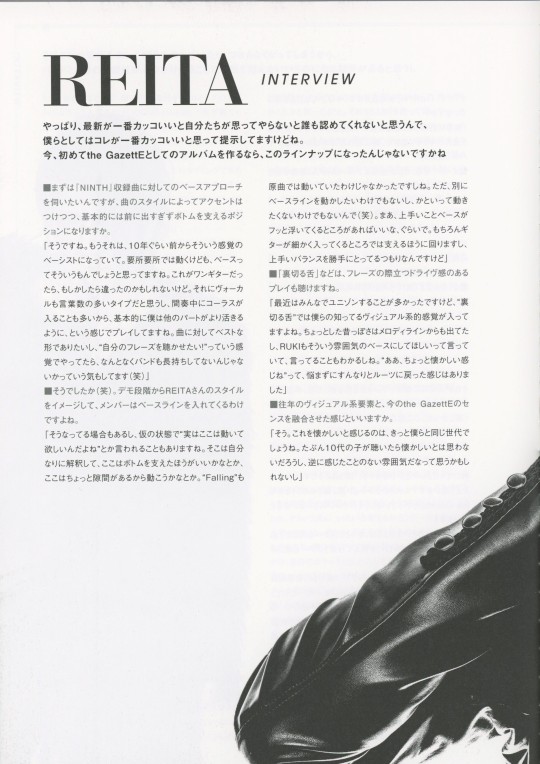
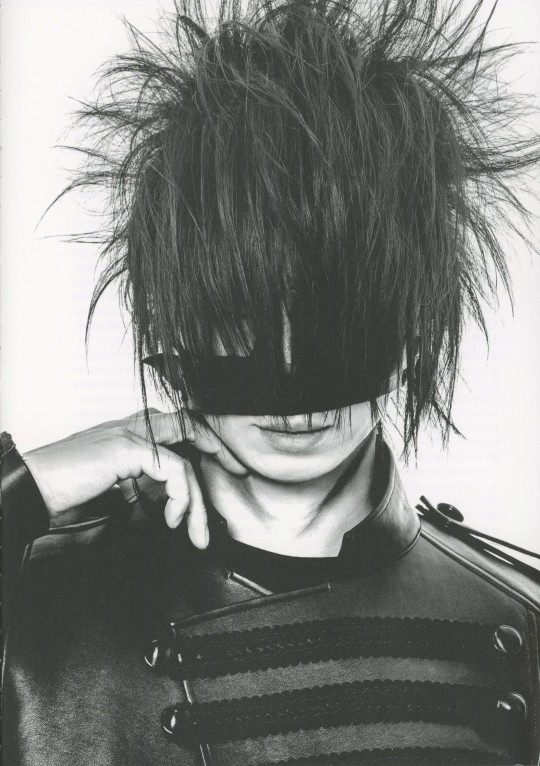
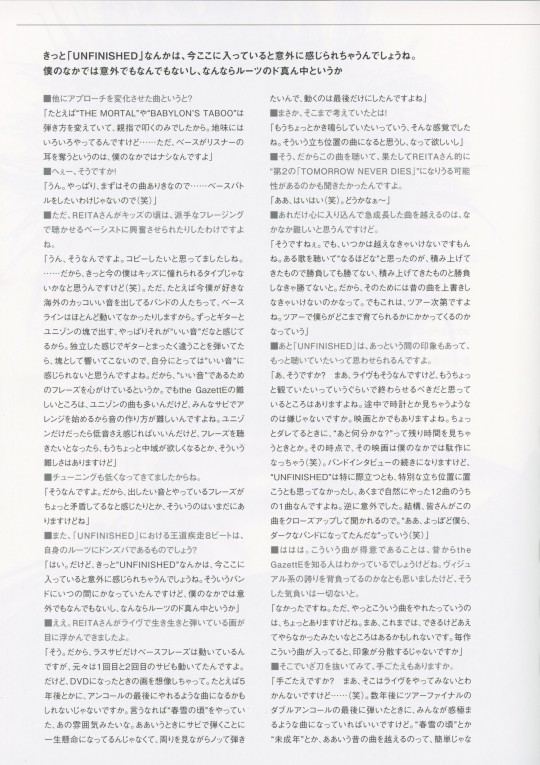
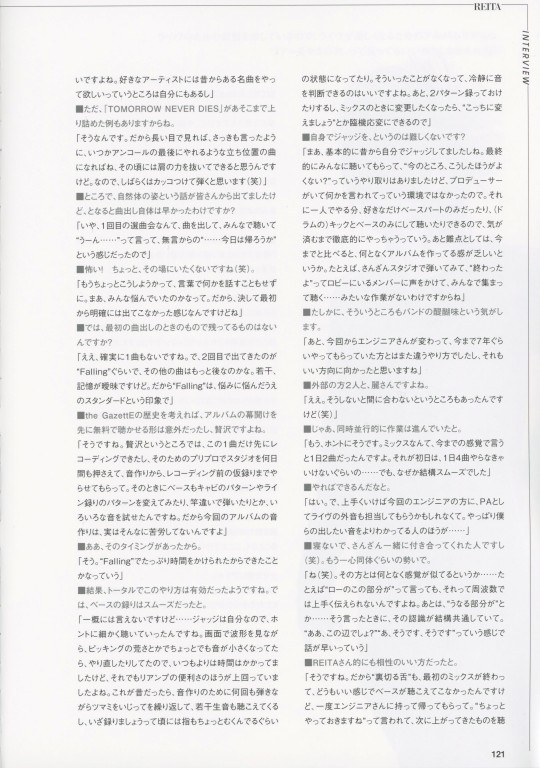
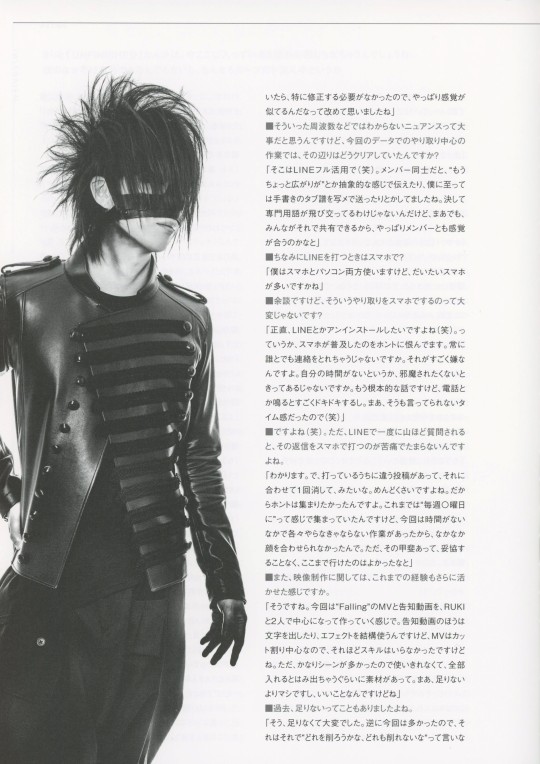
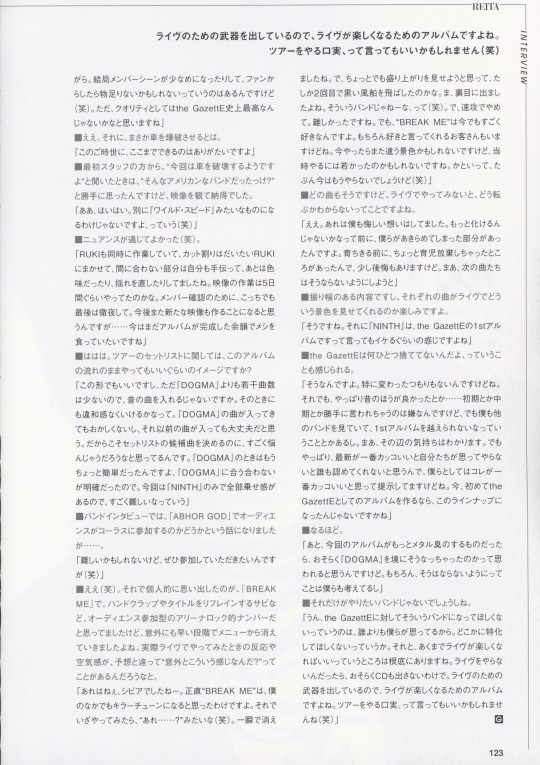
■ Interviewer: First, I’d like to ask about your approach to the songs on "NINTH." You add accents depending on the style of the song, but do you generally take a position that supports the bottom without standing out too much?
Reita: "Yes, that’s right. I’ve been that kind of bassist for about ten years now. I do move around at key points, but I think that’s what the bass should do. If it were a one-guitar setup, it might have been different. Plus, our vocalist uses a lot of words, and often includes choruses during interludes, I generally play to let other parts shine more. I want to be in the best shape for the song, and if I play with the feeling of wanting to hear my own phrases, I feel like the band wouldn't last long (laughs)."
■ Interviewer: I see (laughs). From the demo stage, do the other members incorporate the bass line with your style in mind?
Reita: "Sometimes it works out that way, and sometimes they tell me that they want me to move more in certain parts that were initially placeholders. I interpret it in my own way, thinking maybe I should support the bottom here or move around a bit there if there’s space. 'Falling' wasn’t moving in the original song either. It’s not that I particularly want to move the bass line, but I don’t mind moving either (laughs). It’s just about finding a balance where the bass stands out in a good way. Of course, I support the parts where the guitar comes in intricately, and I think I’m doing a good job of finding that balance on my own."
■ Interviewer: In songs like 'Uragiru Bero,' we can hear your driving, standout phrasing.
Reita: "Recently, we’ve been doing a lot of unison playing, but 'Uragiru Bero' incorporates the visual kei sensibility that we’re familiar with. The melody line has a bit of an old-fashioned feel, and RUKI wanted that kind of bass vibe too, so I understood what he meant."
■ Interviewer: It's like blending the nostalgic visual kei elements of yesteryears with the current sense of the GazettE.
Reita: "Yeah. I think those who feel this as nostalgic are probably our generation. Teenagers today probably wouldn't find it nostalgic; they might even feel it's an atmosphere they've never experienced."
■ Interviewer: Are there other songs where you've changed your approach?
Reita: "For example, 'THE MORTAL' and 'BABYLON'S TABOO' had different playing styles, using only the thumb to strike. I'm quietly doing various things, but stealing the listener's ears with the bass isn't my thing."
■ Interviewer: Oh really?
Reita: "Yeah. After all, it's all about the song itself... I'm not looking to have a bass battle (laughs)."
■ Interviewer: However, when REITA was a kid, he was excited by bassists who dazzled with flashy phrasing, right?
Reita: "Yeah, that's right. I wanted to copy them... So I think maybe I'm not the type who kids would idolize now (laughs). But, for example, the cool bands abroad that I like these days, their bass lines hardly move. They often create a mass of unison with guitars, and that's what I feel is 'good sound.' If I were playing something completely different from the guitar in an independent manner, it wouldn't resonate as a cohesive sound, and to me, that wouldn't feel like 'good sound.' So, I try to focus on phrases that contribute to what I perceive as 'good sound.' But the challenging part with the GazettE is that even in unison songs, everyone starts arranging things in the chorus, so creating sound becomes difficult. If it were just unison, feeling the bass would be enough, but when you want to hear the phrases, you start to feel the need for a bit more midrange, and that's the difficulty."
■ Interviewer: Tuning has also become lower.
Reita: "Yeah, that's right. So, sometimes I feel there's a contradiction between the sound I want to produce and the phrases I'm playing."
■ Interviewer: Also, the straightforward 8-beat rush in "UNFINISHED" must resonate with your roots.
Reita: "Yes. But I'm sure 'UNFINISHED,' for example, might feel surprisingly placed here now. I've become part of such a band without even realizing it, but in my mind, it's neither surprising nor anything else—it's right at the heart of our roots."
■ Interviewer: I can picture you vividly playing it live.
Reita: "Yes, so the bass phrase moves only in the last chorus, but originally it moved in the first and second choruses as well. But I imagined how it would look on DVD. It might become a song we play as an encore in five years. Like when we used to play 'Shunsetsu no koro.' In such moments, I want to play while looking around rather than being engrossed in playing during the chorus, so I kept the movement only in the last part."
■ Interviewer: Wow, I didn't expect you to think that far ahead!
Reita: "It was more of a feeling that I wanted to strum a bit more. I hope it becomes a song that holds that kind of position."
■ Interviewer: I wanted to ask if 'UNFINISHED' could become a second 'TOMORROW NEVER DIES' for you.
Reita: "Ah, yes, well (laughs). Who knows."
■ Interviewer: It seems quite challenging to surpass a song that has embedded itself so deeply in your heart and undergone rapid growth.
Reita: "Yes, but we have to surpass them, right? There's a song that made me think, 'I can't win with just what I've built up, I have to compete with what I've stacked up. So, we might have to overwrite the old songs for that. But that depends on the tour. It’s about how much we can nurture it during the tour."
■ Interviewer: Also, 'UNFINISHED' feels like it goes by quickly. It leaves you wanting to hear more.
Reita: "Really? Well, the same goes for live performances; it’s better to end just when people want to see a bit more. You don’t want them looking at the clock. Like with movies, if you start checking how much time is left, that movie becomes a failure for me (laughs). 'UNFINISHED' wasn’t intended to stand out or be in a special position; it’s just one of the 12 tracks we naturally created. It was surprising that people focused on this song so much. It made me realize how dark our band had become (laughs)."
■ Interviewer: Hahaha. Fans who've known the GazettE for a long time would understand that you excel in such songs. You carry the pride of visual kei, but there’s no pressure, right?
Reita: "There wasn’t any. But I do feel relieved that I finally got to do this kind of song, though. Well, in the past, there might have been times when we could have done it but deliberately chose not to. If this kind of song is in every album, the impression might get diluted, you know?"
■ Interviewer: So, when you finally draw your sword, does it feel satisfying?
Reita: "Is it satisfying? Well, I won't know until we do it live… (laughs). If it becomes a song that makes everyone emotional when played at the end of an encore in a few years, that would be great. It's not easy to surpass old songs like 'Shunsetsu no koro' or 'Miseinen.' There's a part of me that wants to perform classic songs like my favorite artists do."
■ Interviewer: But, there is also the example of "TOMORROW NEVER DIES" rising up that high.
Reita: "Yes, that's right. So, in the long run, as I mentioned earlier, if it becomes a song positioned for the last encore someday, by then, I think I can relax and perform it. So, for a while, I'll probably play it cool (laughs)."
■ Interviewer: By the way, there was talk about everyone being in their natural element, so did the songwriting process itself happen quickly?
Reita: "No, at the first song selection meeting, we played the songs and everyone listened and went 'Hmm…' and then fell silent… and then there was 'Should we go home today?' kind of feeling."
■ Interviewer: Scary! I wouldn't want to be there (laughs).
Reita: "We didn't even discuss things like 'Should we do it this way?' Maybe everyone was just troubled. So, it didn't come together clearly from the beginning."
■ Interviewer: So, none of the songs from the initial selection remain?
Reita: "No, there's not a single one. The second time, we brought out 'Falling,' and the other songs came even later. My memory is a bit vague, but 'Falling' is the standard that came out after much deliberation."
■ Interviewer: Considering the history of the GazettE, it was a luxury to let people listen to the opening track of the album for free.
Reita: "That's right. Speaking of luxury, we were able to record just this one song in advance, and we spent many days in the studio for pre-production, trying out different sounds and doing a preliminary recording before the actual recording. We experimented with various sounds by changing the pattern of the bass cabinet and line recording, and playing with different basses. So, making the sound for this album wasn't really that hard."
■ Interviewer: Ah, it was because of that timing.
Reita: "Yes. I think it was possible because we spent plenty of time on 'Falling'."
■ Interviewer: As a result, this method proved effective overall. So, recording the bass went smoothly?
Reita: "I can't say definitively… I was the judge myself, so I listened very carefully. I was looking at the waveforms on the screen, and if the volume dropped even slightly due to rough picking, I would redo it. So, it took more time than usual, but the convenience of re-amping outweighed it. If this were in the past, I would have played repeatedly to tweak the knobs for sound creation, and by the time we were ready to record, my fingers would have been a bit swollen. Eliminating these issues allows for a calm judgment of the sound. Also, recording in two different patterns allows flexibility during mixing if we want to make changes."
■ Interviewer: Isn't it difficult to judge by yourself?
Reita: "Well, basically, I've always been the one to judge. In the end, I would let everyone listen and there would be exchanges like 'Wouldn't it be better to do it this way?' But we didn't have a producer telling us what to do. Since I did it alone, I could listen to just the bass part or only the bass and drums as much as I wanted, so I could be thorough. However, compared to before, it feels less like making an album. For example, after playing in the studio and saying 'It's done!' and calling everyone to the lobby to listen together—that kind of thing isn't there anymore."
■ Interviewer: Certainly, those are the charms of being in a band.
Reita: "Also, from this time, we changed engineers, and it was different from the way we had done it for about seven years, which I think was a good change."
■ Interviewer: It was two external people and Uruha, right?
Reita: "Yes. We couldn't have finished in time otherwise (laughs)."
■ Interviewer: So, the work progressed simultaneously?
Reita: "Yes, really. For the mix, it used to be two songs a day. But on the first day, we had to do four songs a day… But somehow it went quite smoothly."
■Interviewer: You found out you can do it if you try.
Reita: "Yes. And if it goes well, we might have the current engineer handle the live sound as a PA. After all, it's better to have someone who understands the sound we want to produce."
■ Interviewer: Someone who stayed up with you all night and accompanied you extensively (laughs). Almost like being of one mind.
Reita: "Yes (laughs). It feels like we have a similar sense… For example, if I say 'this low part,' it's hard to convey in terms of frequency. But if I say 'the growling part'... When I say those things, our understanding aligns quite well. 'Ah, around here?' 'Yes, exactly,' that kind of quick communication.
■ Interviewer: It seems like you had good chemistry with this engineer.
Reita: "Yes. So with 'Uragiru Bero,' the initial mix didn’t quite capture the bass well, but when the engineer took it back and said, 'I'll tweak it a bit,' the next version he brought back didn’t need any further adjustments. It reaffirmed that our senses were indeed similar."
■ Interviewer: These nuances that can’t be conveyed through frequencies are important. How did you manage that in a process primarily involving data exchange?
Reita: "We used LINE to the fullest (laughs). Among the members, we would communicate in abstract terms like ‘a bit more spread out,’ and I would even send handwritten tab sheets via photo. We didn’t use technical jargon, but everyone could understand it, so I guess we’re in sync with each other."
■ Interviewer: Do you use your smartphone for LINE messages?
Reita: "I use both my smartphone and my computer, but mostly my smartphone."
■ Interviewer: On a side note, isn't it challenging to handle such exchanges on a smartphone?
Reita: "Honestly, I’d love to uninstall LINE (laughs). I actually resent the widespread use of smartphones. You can always be reached by anyone, which I really dislike. There are times when you don’t want to be disturbed and need your own time. On a fundamental level, when the phone rings, it makes me really anxious. But we couldn't avoid using it given the time constraints (laughs)."
■ Interviewer: Right (laughs). But it's really painful to type out lengthy replies on a smartphone when bombarded with questions on LINE.
Reita: "I get that. And then, while typing, you get another message, so you have to start over. It’s annoying. I really wanted us to meet in person. We used to gather every week on a specific day, but this time, due to our tight schedules, we had to handle our tasks individually. However, it was worth it because we didn’t have to compromise, and we achieved a lot."
■ Interviewer: Did your previous experiences help in the video production this time as well?
Reita: "Yes. This time, RUKI and I primarily took the lead in making the 'Falling' MV and the promotional video. The promotional video involved a lot of text and effects, while the MV focused on cutting scenes, so it didn’t require as much skill. However, there were so many scenes that we couldn't fit everything in. It’s better to have too much material than too little, so it was a good problem to have."
■ Interviewer: There have been times when there wasn’t enough material, right?
Reita: "Yeah, it was tough when there wasn’t enough. But this time, we had so much material that we had to decide what to cut, and it was hard because we didn't want to cut anything. As a result, the scenes featuring the members might be a bit fewer, which could leave fans wanting more (laughs). However, I think the quality is the best in the history of the GazettE."
■ Interviewer: Yes. And I couldn’t believe you actually blew up a car.
Reita: "In this day and age, it’s great that we could do something like that."
■ Interviewer: When the staff first mentioned that you were going to destroy a car, I thought, "Are you really that kind of American band?" But after watching the video, I understood.
Reita: "Oh, yes, yes. It’s not like we’re making 'Fast and Furious' or anything (laughs)."
■ Interviewer: I’m glad the nuance came across (laughs).
Reita: "RUKI was also working on it simultaneously. He handled most of the editing, and I helped with the parts he couldn't finish, adjusting colors and fixing the shakiness. We worked on the video for about five days. We even stayed up all night for the final member check. We'll probably be making new videos again soon... but for now, I just want to enjoy the completion of the album."
■ Interviewer: Haha. Regarding the tour setlist, do you plan to follow the flow of this album?
Reita: That’s one way to do it, but since there are slightly fewer songs on this album compared to "DOGMA," we’ll include some older songs. I think they’ll blend in seamlessly. Whether we include songs from "DOGMA" or even older tracks, it shouldn’t feel out of place. This will make selecting the setlist quite challenging. With "DOGMA," it was easier because it was clear which songs fit. This time, with the inclusive nature of "NINTH," it’s a lot more difficult.
■ Interviewer: In a band interview, there was a discussion about whether the audience will participate in the chorus for 'ABHOR GOD.'
Reita: "It might be difficult, but I definitely want them to join in (laughs)."
■ Interviewer: Yes (laughs). Personally, 'BREAK ME' came to mind. With its hand claps and chorus, it seemed like an arena rock number meant for audience participation. But it disappeared from the setlist surprisingly quickly. I imagine the live reaction wasn’t what you expected?
Reita: "Yeah, that was tough. Honestly, I thought 'BREAK ME' would be a killer tune. But when we played it, it was like, "Oh…?" (laughs). It disappeared almost immediately. We even tried to hype it up by releasing black balloons during the second performance, but that backfired. It made us realize we weren’t that kind of band (laughs). So we quickly dropped it. But I still really like "BREAK ME." Some fans do too. It might look different now if we performed it, but it probably won’t happen (laughs).
■ Interviewer: You never know how a song will go over live until you try it.
Reita: "Yeah. I was disappointed too. We gave up on it before it could fully develop. There’s a bit of regret, but we’re determined not to let that happen with the new songs.
■ Interviewer: With such a wide range of content, I’m excited to see how each song will unfold live.
Reita: "Yes. 'NINTH' feels like it could be our first album. It shows that the GazettE hasn't discarded anything."
■ Interviewer: Despite not intentionally changing, some people might say they prefer your early or mid-period work.
Reita: "Yes, I understand that feeling. We don’t feel like we’ve changed, but we get comments about how the old stuff was better or how people prefer our early or mid-period work. I understand that sentiment because I’ve felt that way about other bands. But we believe the latest work is the coolest, and we present it as such. If we were to make our first album now, it would likely be this lineup of songs.
■ Interviewer: I see.
Reita: "If this album had a stronger metal smell, people might think we changed after 'DOGMA.' But we make sure not to go in that direction."
■ Interviewer: You’re not a band that wants to stick to just one thing.
Reita: "Exactly. We don't want to be pigeonholed into one genre. As long as our live shows are enjoyable, that's what matters. We wouldn’t release CDs if we didn’t perform live. The album is meant to make our live shows fun. You could even say it’s an excuse to tour (laughs)."
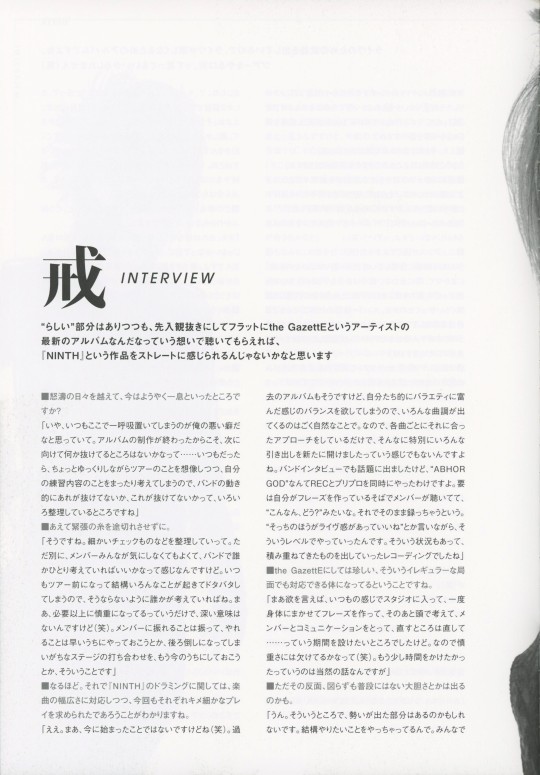
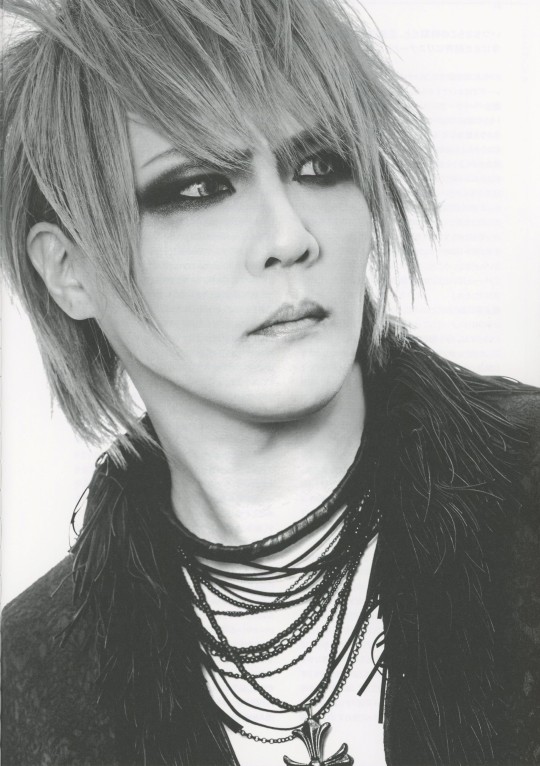
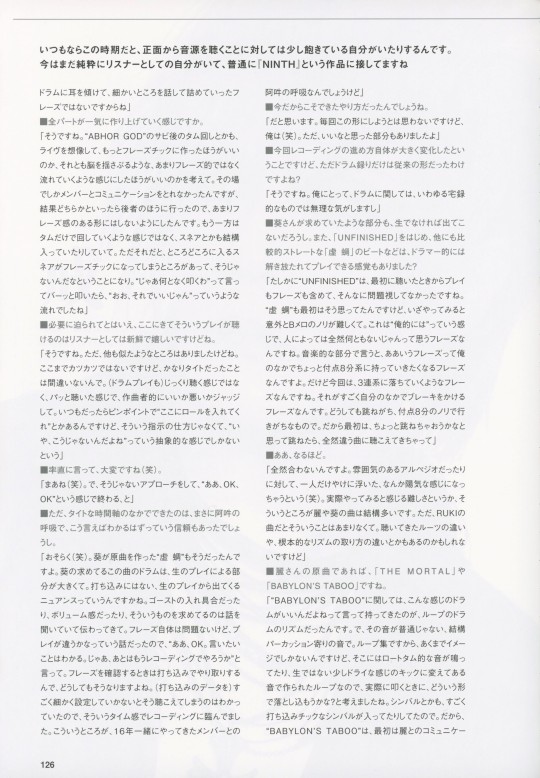
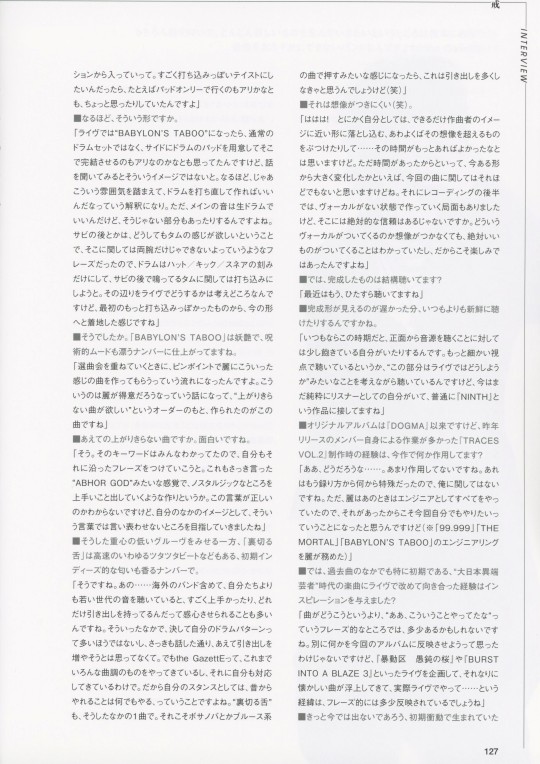
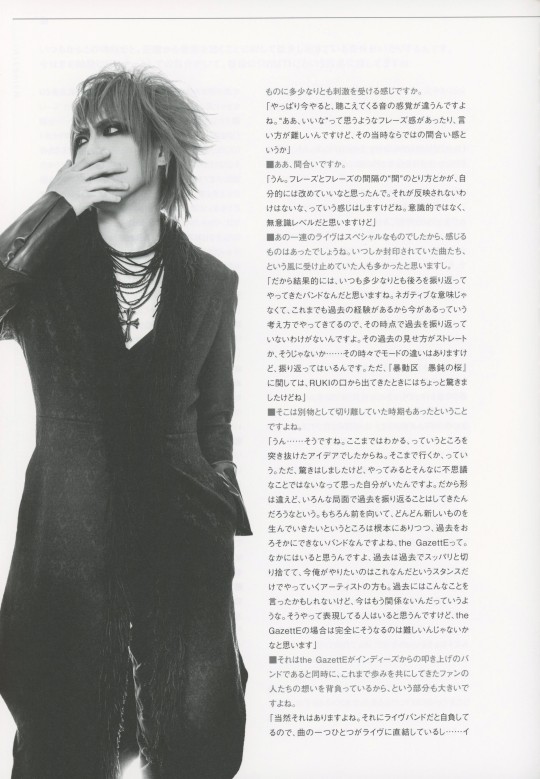
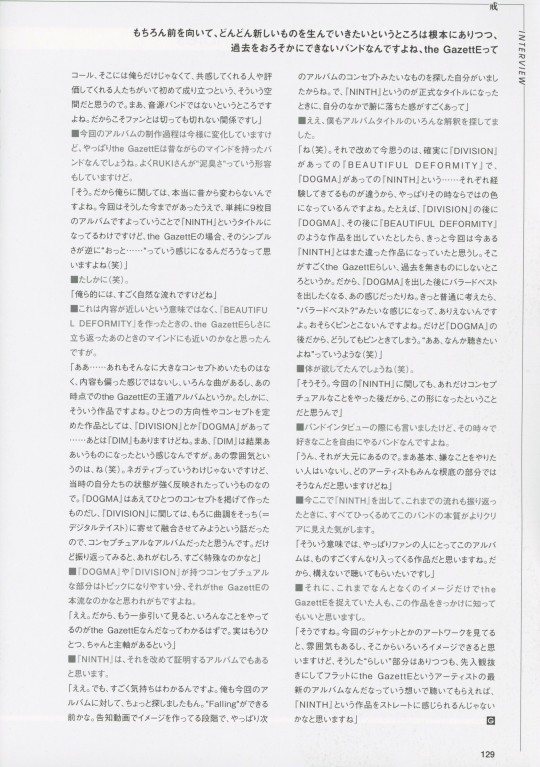
■ Interviewer: After the whirlwind days, are you finally able to take a breather now?
Kai: "Well, I always think that taking a breather at this point is one of my bad habits. Now that the album production is over, I'm thinking if there's anything we've missed for the next step. Usually, I'd relax a bit while imagining the tour, casually considering my practice routines, but now I'm trying to organize everything, checking if the band is missing anything."
■ Interviewer: So you're intentionally keeping the tension high.
Kai: "Yes, I'm organizing the finer details. Not that everyone in the band needs to worry about it; it’s enough if one person thinks about it. There are always a lot of last-minute issues before a tour, so I'm trying to prevent that by planning ahead. It’s just that I'm being extra cautious without any deeper meaning (laughs). I'm trying to delegate tasks early on and have meetings about the stage setup that we usually push back."
■ Interviewer: I see. Regarding the drumming on "NINTH," it seems you had to play with a lot of precision while adapting to the wide variety of songs.
Kai: "Yes. Well, it's nothing new (laughs). Our previous albums also had a variety of songs because we like a diverse balance, so it's natural for different styles to emerge. For each song, I just approach it in a way that fits, and it's not like I opened up a lot of new possibilities. In the band interview, we mentioned how we did the recording and pre-production for 'ABHOR GOD' simultaneously. Basically, while I was creating the phrases, the members were listening and saying things like, 'How about this?' and then we recorded it on the spot. It was like, 'This has a live feel to it,' so we did it at that level. It was a recording where we built on what we had accumulated."
■ Interviewer: It's rare for the GazettE to handle irregular situations like that, but you managed well.
Kai: "If I could have my way, I'd prefer to spend time in the studio as usual, creating phrases instinctively, then thinking them over, communicating with the members, and making adjustments. So, I felt a bit less cautious this time (laughs). Naturally, I wished we could have taken more time."
■ Interviewer: On the other hand, it might have resulted in boldness that you wouldn't usually have.
Kai: "Yes, that might have brought some momentum. We ended up doing what we wanted. Normally, around this time, I’d be a bit tired of listening to the recordings. But now, I still have a pure listener's perspective and am engaging with 'NINTH' as a regular listener. Since the drum parts weren't meticulously crafted through detailed discussions, it feels fresh."
■ Interviewer: So all parts were created simultaneously.
Kai: "Yes. For example, with the tom rolls after the chorus in 'ABHOR GOD,' I thought about whether to make the phrases more structured for live performance or to let it flow more naturally, not too structured. I could only communicate with the members on the spot, and we decided on the latter, making it less structured. The other option was to use only toms, but we included a lot of snare too. But that made the snare parts feel too structured, so we decided against it. I ended up saying, 'I'll just play it roughly,' and when I did, they said, 'That works.'"
■ Interviewer: Although it was necessary, hearing such playstyles now is fresh and exciting for listeners.
Kai: "Yes, though other parts were similar. It wasn’t as rushed, but it was certainly tight. Instead of detailed listening, we quickly judged whether something was good or not. It was judged by the composers, usually, they might ask for specific rolls at certain points, but this time it was more abstract like, 'No, that's not quite right.'"
■ Interviewer: Honestly, it sounds tough (laughs).
Kai: "Well, yes (laughs). And when I tried a different approach, they'd say, 'Yeah, that's fine,' and that would be it."
■ Interviewer: Even though you were working under tight time constraints, there must have been a sense of mutual understanding and trust, like knowing what each other meant without needing to explain everything.
Kai: "Probably (laughs). That was the case with "Utsusemi" that Aoi composed. It required a lot of live drumming nuances that can't be captured by programming. Listening to Aoi, I understood he wanted those ghost notes, volume dynamics, and so on. It wasn't the phrase itself that was an issue but the way it was played. We communicated using programmed data, but it was clear we needed live recording. This level of understanding is a result of our 16 years together."
■ Interviewer: It was a method that worked precisely because of your long experience together.
Kai: "I think so. I wouldn't want to do it this way every time (laughs). But there were good aspects to it."
■ Interviewer: Though the recording process changed significantly, you still recorded the drums traditionally, right?
Kai: "Yes. For me, recording drums at home wouldn’t work."
■ Interviewer: For parts like those in 'UNFINISHED' and the straightforward beats in 'Utsusemi' did you feel more liberated as a drummer?
Kai: "When I first listened to 'UNFINISHED,' I didn't have any issues with the play or the phrases. I felt the same about 'Utsusemi' at first, but the B-melody’s groove was surprisingly tricky. It might seem easy to others, but for me, it was challenging. Musically, I tend to lean towards dotted eighth-note feels, but this time, it was more triplet-based. This created a mental block for me, as I naturally gravitate towards that dotted feel. Trying to swing it slightly made the song sound completely different."
■ Interviewer: Ah, I see.
Kai: "It didn’t fit at all. With the atmospheric arpeggio, my part felt oddly cheerful and out of place (laughs). This kind of difficulty is common with Uruha and Aoi’s songs. But with RUKI’s songs, I don't encounter that as much. It might be due to the different musical roots we've listened to or the fundamental differences in how we perceive rhythm."
■ Interviewer: With Uruha’s compositions, like "THE MORTAL" or "BABYLON'S TABOO."
Kai: "For 'BABYLON'S TABOO,' he brought a drum loop rhythm and said, 'This is the kind of drum feel I want.' The sound was unusual, quite percussive. It was a loop with sounds like roto-toms and a dry kick, not quite live. So, I had to think about how to replicate that feel in live play. Even the cymbals in the loop were very electronic. So, I started by communicating with Uruha. If he wanted a very electronic feel, I thought we might even consider using only pads."
■ Interviewer: I see, that's the approach you took.
Kai: "When we play 'BABYLON'S TABOO' live, I thought it might be better to use a drum pad on the side instead of a traditional drum set, but after talking it over, that wasn’t the image we wanted. So, I interpreted it as needing to rework the drums to fit that atmosphere. The main sound would be live drums, but there were parts where that wouldn't work. For example, after the chorus, Uruha wanted the toms to come through, but the phrase required more than just two arms. So, I decided to keep the live drums for the hi-hat, kick, and snare, but use programming for the toms after the chorus. How to handle this in a live setting is something we'll have to figure out, but it evolved from a very programmed sound to its current form."
■ Interviewer: I see. "BABYLON'S TABOO" has a seductive, ritualistic mood.
Kai: "When we were selecting songs, we specifically asked Uruha to compose a song with this feel. We thought this was Uruha's forte, and we asked him for a song that doesn’t fully climax. That’s how this song was created."
■ Interviewer: A song that intentionally doesn’t fully climax—interesting.
Kai: "Yes. Everyone understood that keyword, so I created my phrases to align with that. Similar to 'ABHOR GOD,' the idea was to bring out a nostalgic feel. I'm not sure if this is the right word, but I aimed for something beyond what words can describe."
■ Interviewer: While you show a low, grounded groove, "Uragiru Bero" features a fast beat, reminiscent of your early indie days.
Kai: "That's right. When I listen to music by younger bands, including those overseas, I often find them really skillful and impressive in terms of how many tricks they have up their sleeves. In that context, I don't have a wide variety of drum patterns, and as I said earlier, I don't deliberately try to expand my repertoire. But the GazettE has done various types of songs over the years, and I’ve adapted to them. My stance has always been to do whatever I can, and 'Uragiru Bero' is one of those tracks. If we were to do something like bossa nova or blues, then I’d think about expanding my repertoire (laughs)."
■ Interviewer: That’s hard to imagine (laughs).
Kai: "Haha! My goal is always to match the composer’s image as closely as possible, and if I can, surpass their expectations. I wish we had more time, but even if we did, I don't think the songs would have changed significantly. In the latter half of the recording, we worked on some tracks without vocals, but we have absolute trust in each other. Even if I couldn’t imagine the vocals, I knew they’d be great, so it was something to look forward to."
■ Interviewer: So, have you been listening to the finished product a lot?
Kai: "Recently, I've been listening to it constantly."
■ Interviewer: Since the final version took longer to come together, does it feel fresher than usual?
Kai: "Usually, by this time, I’m a bit tired of listening to the tracks repeatedly. I’d be listening with a more critical ear, thinking about how to perform certain parts live. But now, I’m still approaching 'NINTH' as a pure listener."
■ Interviewer: It’s your first original album since "DOGMA." Did the experience of making "TRACES VOL.2," which involved a lot of work from the members themselves, influence this album?
Kai: "Well, let’s see... not really. The recording process for that was very unique, so it didn’t affect me much. However, Uruha did all the engineering for 'TRACES VOL.2,' and that experience led him to want to handle some engineering himself this time (he engineered '99.999,' 'THE MORTAL,' and 'BABYLON'S TABOO')."
■ Interviewer: So, did revisiting your older songs from the "Dainippon Itangeisha" era during live performances provide any inspiration?
Kai: "It’s less about the specific songs and more about the phrases. It’s like, ‘Oh, we used to do stuff like this,’ so there might be some influence in that sense. I didn’t set out to reflect anything specific from those songs in the new album, but organizing live events like 'Boudouku Gudon no Sakura' and 'BURST INTO A BLAZE 3' brought back nostalgic tracks that we performed live… so that process might have influenced some of the phrases."
■ Interviewer: It must have been somewhat stimulating to revisit those early impulses that you might not be able to capture now.
Kai: "Yeah, when we play them now, the way we perceive the sounds is different. There are phrases where I think, ‘Oh, this is nice,’ and it’s hard to explain, but there’s a sense of timing unique to that period."
■ Interviewer: Timing, you say.
Kai: "Yes. The spacing between phrases, the way we handled the ‘ma’ (space), I found it to be quite good upon revisiting. It's probably at an unconscious level rather than something deliberate."
■ Interviewer: Those live performances were special, and I’m sure they left an impression. Many fans likely saw those songs as sealed away.
Kai: "As a band, we’ve always looked back to some extent. Not in a negative way, but we believe that the present is built on past experiences, so it’s impossible not to reflect on the past. Whether we show it straightforwardly or in a different mode varies, but we do reflect on it. But I was a bit surprised when Ruki suggested ''Boudouku Gudon no Sakura"."
■ Interviewer: That period was considered separate, right?
Kai: "Yes… exactly. It was an idea that went beyond what we understood up to that point. It was like, 'We're going that far?' I was surprised, but when we actually did it, it didn't seem so strange. So, in various ways, we've been reflecting on our past. At the same time, we have a fundamental desire to look forward and create new things. The GazettE is a band that can't neglect its past. There are some artists who can completely cut off their past and say, 'This is what I want to do now,' and I think that's a valid approach. They might have said something in the past but now say it doesn't matter anymore, but I don’t think that’s possible for the GazettE."
■ Interviewer: That’s partly because the GazettE is a band that has grown from the indie scene and carries the sentiments of the fans who have walked with you all this time.
Kai: "Of course, that's a big part of it. We pride ourselves on being a live band, so each song is directly connected to our live performances. While we fundamentally want to keep looking forward and creating new things, we are a band that can't neglect our past. It's not just about us; it's a space that only exists because there are people who empathize with us and appreciate us. Essentially, we're not just a recording band. That's why we have an inseparable relationship with our fans."
■ Interviewer: The creation process for this album has evolved, but it seems that the GazettE still retains its old-school mindset. RUKI often describes it as having a “gritty” quality.
"Exactly. We've really remained unchanged since the old days. This time, the album is simply our ninth one, hence the title 'NINTH.' For the GazettE, that simplicity is actually quite surprising, I think (laughs)."
■ Interviewer: Indeed (laughs).
Kai: "For us, it’s a very natural progression."
■ Interviewer: In terms of essence, it feels similar to when you made 'BEAUTIFUL DEFORMITY,' where you returned to the GazettE's roots.
Kai: "Ah… that one didn't have a grand concept either, and the content wasn't biased; it had various songs. It was a quintessential GazettE album at that time. Certainly, it's a similar work. For albums with a more defined direction or concept, there’s 'DIVISION' and 'DOGMA'... and also 'DIM.' Well, 'DIM' ended up being what it was. That atmosphere... (laughs). It’s not negative, but it strongly reflected our state at the time. 'DOGMA' was deliberately made with a specific concept, and 'DIVISION' was a conceptual album aimed at blending styles with a digital taste. Looking back, those albums are rather unique."
■ Interviewer: The conceptual nature of 'DOGMA' and 'DIVISION' often makes them seem like the main essence of the GazettE.
Kai: "Yes. But if you take a step back, you should realize that the GazettE does many different things. Actually, there's another core principle that we stick to."
■ Interviewer: I think 'NINTH' is an album that reaffirms that.
Kai: "Yes. But I totally understand the sentiment. Even I was searching for a concept for this album at first, before 'Falling' was created. When we were making the promotional videos, I was looking for something that would define the next album. So when 'NINTH' became the official title, it felt very right to me."
■ Interviewer: Yes, I also searched for various interpretations of the album title.
Kai: "Right (laughs). Looking back now, 'BEAUTIFUL DEFORMITY' definitely happened because of 'DIVISION,' and 'NINTH' is happening because of 'DOGMA'… Each experience we've had creates its own unique color, so it naturally reflects the essence of that time. For instance, if we had released something like 'BEAUTIFUL DEFORMITY' right after 'DIVISION,' following 'DOGMA,' I think this 'NINTH' would have been a completely different album. That’s very GazettE-like, not disregarding the past. After releasing 'DOGMA,' we wanted to release a ballad best-of album. Normally, people might think, 'A ballad best-of album? That’s impossible.' But because it came after 'DOGMA,' it made sense. 'Oh, I kind of want to listen to that,' you know (laughs)."
■ Interviewer: Your body must have been craving it (laughs).
Kai: "Exactly. The reason 'NINTH' took this shape is because it came after such a conceptual project."
■ Interviewer: The GazettE is a band that does what they like freely at any given moment.
Kai: "Yes, that’s the main principle. Basically, no one wants to do things they don’t like. I think all artists share that at a fundamental level."
■ Interviewer: Releasing 'NINTH' now and looking back at the flow of everything so far, it feels like the essence of this band has become clearer than ever.
Kai: "In that sense, this album should be very easy for fans to embrace. I hope they listen to it without any preconceived notions."
■ Interviewer: Moreover, I think people who have only had a vague impression of the GazettE until now might also take this opportunity to get to know them through this work.
Kai: "Yes, I think so too. When you look at the artwork of this album, you can feel the atmosphere and imagine various things. While it retains that GazettE-like essence, I hope people can listen to 'NINTH' with a fresh perspective, free from preconceived notions, and feel it as the latest album from the GazettE."
46 notes
·
View notes
Text
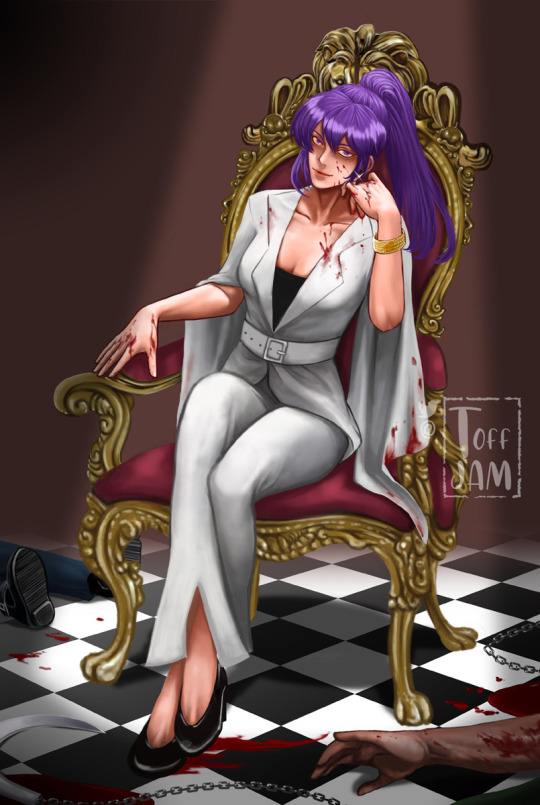
Couldn’t help myself, adding to the Kengan OC posts on tumblr because I was too nostalgic
This is Chizuru Hirawa, ex-Purgatory fighter, now the CEO of Rakuzen co. Ruthless and cold, she has a reputation for challenging big companies in risky moves. And more often than not, she wins.
The one person she truly, truly hates is the former chairman of the Kengan Association, Katahara Metsudo; her goal is to crush him and Dainippon bank, no matter what it takes- Even if it means getting back into the ring herself.
There’s a reason why Chizuru and her mansion is covered in blood in that picture… but that’s a story for another time ❤️
Art is by Toffjam on Twitter, check them out for hot guys 🔥 I may or may not be responsible for the requesting most of Falcon art lmao
18 notes
·
View notes
Text
Semi-random manga rec based on looking at what I rated 10/9/8 on myanimelist like a decade ago
For your benefit I am going to eschew the stuff I see discussed on tumblr all the time. Like by this point no one needs me to tell them that like, Junji Ito is good, right? Right.
The water is just fine:
Hikaru no Go - now this one used to be pretty big in fandom spaces but it was like fifteen years ago so I don't feel bad bringing it up. It's a sports shonen about a boy falling in love with Go and growing up through finding his passion in it. A classic bildungsroman type of shonen narrative but executed with finesse. Also illustrated by the same guy who drew Death Note if that sweetens the pot.
Kekkaishi - do you guys like a fun little shonen about creatures and youth with magic powers and shit? This one is simply a pleasure to read as well as well paced. I especially appreciate a somewhat strict magical/power system. Maybe it's nothing insanely special but I do feel it has been somewhat overlooked so I put it on this list.
Hourou Musuko - this one got an anime fairly recently (*checks notes* uhhh. In 2011. Nvm, kill me) so people might know it. But hey, you guys want a sweet little manga story about a teen trans girl and her gaggle of friends? Of course you do. This managaka generally writes a lot of stories about queer ppl, so feel free to check out all her work.
Ashita no Ousama - bildungsroman, but for the girlssss. It's a story about a young girl moving to the city and falling in love with theater and writing. I am simply a sucker for stories about people finding their passion and working at it.
Getting deeper:
Blame! - again, a recommendation that would sound sooooo silly like twenty years ago but Tsutomu Nihei is simply not in the public eye the way he used to be. The pleasure of this manga is to a large extent visual. But you guys do want to see a trek through a crazy technological landscape, don't you?
Bokurano - Mangaka is a known sicko and this fucked up little story about feeding children to the war machine is a good entry point. What if Evangelion was even more evil? Now you can find out.
Monster - the Naoki Urasawa story that really put him on the map. I think people say that 20th century boys is superior but why not start at the source? Psychological/mystery story especially suited for people who can set aside their reservation when the psychology gets a little dubious with it (if that's a line you don't cross, do go on and check out 20th century boys instead)
Now we are getting somewhere:
Shigurui - Anyone here looking for an awe-inspiring visual orgy of violence? Anyone?
Dainippon Tengutou Ekotoba - I am outrigh obsessed with this mangaka's visual style. The thick, bold brush lines make me craaaazy. This is as good as any entry into their work, I think - a urban fantasy story about Tengus living in the modern world.
National quiz - looking for a zany distopian sci-fi with great visuals? Look no more!! I don't remember the details of what happens in this one but I remember it being strange and interesting, so do check it out.
Soil - what if Twin Peaks was a manga? Well, it's not one to one, but this too is a story about a small town and fucked up bizarre shit happening in it. Also incredible art, in my opinion.
Shintaro Kago - making an exception here and mentioning a guy instead of a specific work. The thing about Kago is that he shines in writing bizarre short stories, so ultimately you really could start anywhere with him.
#looking at the site I realized I don't remember most of the shit I read... RIP!!!#maybe one day I'll do like a reread of my top picks and a list adjecent to it#weeb tag
33 notes
·
View notes
Text
All The GazettE lives/perfomances available
I decided to organize everything I found (mainly for myself). Let me know if something is missing!
Beautifool's Fest 2003.
Tokyo Saiban ~Judgment Day~ 2004.1.16 fri SHIBUYA-AX.
Heisei Banka 2005.
Peace & Smile Carnival Tour 2005.
Maximum royal disorder 2005.
Nameless Liberty Six Guns 2006.
Decomposition Beauty 2007.
Neo Visual Kei - Manatsu no Utage 2007.
Tour 2007-2008 Stacked Rubbish Grand Finale [Repeated Countless Error].
Manatsu no Utage 2008 Live.
LEECH Live at MUSIC JAPAN 2008.
Gazerock Festival in Summer 08 [Burst into a Blaze].
Peace & Smile Carnival PS company's 10th Anniversary.
Tour09 - Dim Scene - Final At Saitama Super Arena 2009.
Tour 10 Nameless Liberty Six Bullets -01- 2010.
The 4th J-Melo Awards 2010.
The Nameless Liberty at 10.12.26 Tokyo Dome 2010.
SUMMER SONIC 2011 - 2011.09.16.
Inazuma Rock Festival 2011.
Tour11-12 Venomous Cell Finale Omega At 01.14 Yokohama Arena 2012.
Kishidan Banpaku 2012.
10th Anniversary The Decade Live At 03.10 Makuhari Messe 2012.
the 6th J-MELO Awards Live Special 2013.
live tour 12-13 【DIVISION】FINAL MELT LIVE AT 03.10 SAITAMA SUPER ARENA 2013.
Live at SUMMER SONIC 2013.
Kubana 2013.
LIVE TOUR 13-14 [MAGNIFICENT MALFORMED BOX] FINAL CODA LIVE AT 01.11 YOKOHAMA ARENA 2014.
STANDING LIVE TOUR14 HERESY LIMITED -Saiteigi- COMPLETE BOX 2014.
World Tour 2013 Documentary.
Kishidan Banpaku 2014.
Loud Park 2014.
Japan Night in Taipei 2015.
Tour 15-16 Dogmatic final -Shikkoku 2016.
World Tour 2016 Documentary, Dogmatic Trois.
Knotfest 2016 (I couldn't find the video, but I saw a news report that it was broadcasted on tv, so probably it should be somewhere on the internet).
Kishidan Banpaku 2016.
15th Anniversary Dainippon itangeish [BOUDOUKU GUDON NO SAKURA] 2017.
“BURST INTO A BLAZE 3” 2017.
Rock in Japan 2017.
Spooky Box 2 (ABYSS LUCY).
Countdown Japan 17/18.
Rock in Japan 2018.
Live Tour 18-19 THE NINTH FINAL (Live at 09.23 Yokohama Arena).
World tour 2019 Live in New York.
World Tour19 Documentary THE NINTH [99.999].
Rock in Japan 2019.
『BLINDING HOPE』LIVE AT 2021.12.23 TOKYO GARDEN THEATER
20th Anniversary -HERESY- 2022.
Probably I've missed something... And order isn't correct, but still.
47 notes
·
View notes
Text
Headcanons and a short fanfic for Nikaido Ren aka the Watchman🤩
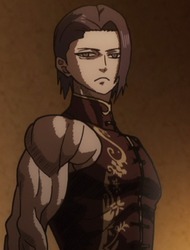
His favorite food is green tea ice cream and egg and leek dumplings.
He often sneaks out to feed stray cats and dogs that are near the bodyguards apartments so that no one can see him and tease him about it.
He's really good at cooking but if often shy to do so for his colleagues or friends. He usually cooks a bunch and leaves it in the staff room with a note for them to help themselves.
He goes for dance lessons of all kinds as a form of exercise and he's really good at it.
He loves poetry and often recites his favorites to his friends or writes his own.
A date with a heavenly wolf...
Y/N was a new bodyguard that started working for Dainippon bank and for Metsudo Katahara. Their talent impressed him to have them work directly with the heavenly wolves and with Nikaido Ren.
He wasn't thrilled about this as it meant that this would take his time away from his duties but he didn't want to upset the master.
"I know only you could do this for me, Ren, seeing as you are only the best~", Katahara cooed.
Nikaido: "...yes...of course, master!"

The old man knew how to pull at the heart strings of his bodyguards since they did adore him and respected him so much.
Nikaido waited outside for Y/N as they would start their training together, making sure his suit was in immaculate condition.
Y/N quickly headed down to where they were told Nikaido would be waiting for him.
"...good morning, I'm Y/N...and you must be Nikaido Ren...", Y/N said gently before bowing to him.
"Yes, the master has asked me to personally train you...so don't disappoint the master...he has a lot of faith in you", he said gently before taking off his suit jacket and took a fighting stance, "...let's begin".
Y/N nodded and began sparring with him.
A few months would go by to where Nikaido was most satisfied with how well Y/N was doing at their training and informed the master as well.
He walked with Y/N to the dining hall for the bodyguards, "...you've been doing so well, Y/N...especially as my first student", Nikaido said calmly as he looked at the menu for lunch and decided what he wanted to eat, he was very fussy after all.
"Thank you! I'd love to thank you for taking me under your wings...how about we go out for dinner?", Y/N asked curiously.
"...I appreciate that but I prefer eating my own cooking, I can cook for us instead...tomorrow night works well for me", he said calmly.
Y/N was about to protest but then just nodded, "...at least let me buy all the groceries".
"Fine, I'll send you the list...", Nikaido said before taking a seat and helping himself to a simple meal.
Y/N smiled happily and nodded, "That's a date!".
It took a moment for Nikaido to register what Y/N had just said and then blushed, "...well...I guess so...", he said softly.
Y/N would show up to Nikaido's apartment with the groceries and was shocked to see that he had already finished the cooking.
"I thought I'd help you to cook but you're already done", Y/N said with a pout they handed him the bag of groceries.
"I wouldn't allow that especially since its the first time you've come to my home...and that too on our first date", Nikaido said with a small smile before placing the bag on the countertop in the kitchen and lit some candles on the dining took table.
"...oh right...first...date", Y/N blushed as they reminded themselves of what they called this meeting, "I brought dessert too...some green tea ice cream".
Nikaido raised his brows in surprise, "...that's my favorite...thank you".
They would sit down and eat the amazing meal that Nikaido made happily.
Y/N praised him and he would just shrug it off but he truly did like the compliments since he didn't get to cook for others often.
Soon they moved to the couch and had some ice cream, "...I think this was a lovely first date, Y/N...perhaps on a second date...we could have a picnic once the weather is cooler", Nikaido said gently, "...if you're willing".
Y/N smiled and nodded, "...I love picnics", the said gently before giving him a kiss on the cheek.
He smiled in response, "...good".
5 notes
·
View notes
Text
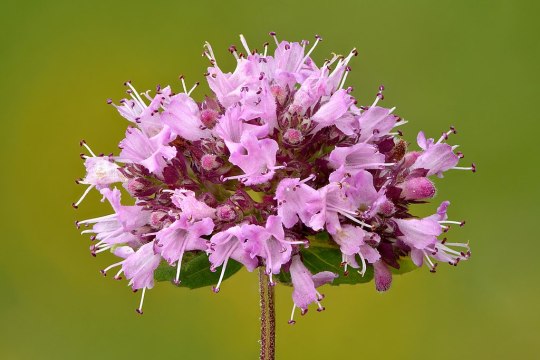
Zur Arli-Dosierung
Arli, ein Neologismus aus Ar-beit und li-eben erlaubt uns durch die sogenannte "Arli-Dosierung" jenen tabuisierten Gedanken aufleben zu lassen, der so oft - auf Grund primitiver Ansichten - im Keim erstickt wird. Dabei ist die Ernährung selbst bereits ein psychopharmakologischer Eingriff. (Ja, selbst ein Teelöffel Weizenmehl lässt sich, wenn man es genau nimmt, als psychotropes Mittel ansehen.) Die "Arli-Dosierung" ist ein Versuch, handelsübliche sowie weggesperrte Substanzen in einer Dosis pro Tag/Woche/Monat/Jahr anzuwenden mit dem Ziel die bevorstehende Arbeit am meisten (wie möglich) zu lieben und somit am leichtesten zu bewältigen. Wieviel Dosis pro Zeitraum ist Gegenstand dieser Forschung. Die Idee einer arbeitsliebenden Medikation stammt von dem Pharmaunternehmen Dainippon Seiyaku. "Philopon" hieß Methamphetamin in seinen Anfängen, was vom griechischen "philoponus" (arbeitsliebend) abgeleitet wird. Wer Arbeit lieben (oder genießen) kann, verdient eine Beachtung, da leichtes Leben lobenswerter ist als (unnötiges) mühseliges Freveln. Gewonnen haben alle, welche den Pfad der Liebe einschlagen. Ob nun mit der Arli-Dosierung von Lebensmitteln oder Arznei, der Erfolg durch jene "ideale Leistung" (bzw. minimale Arbeit durch minimale Zeit) hängt am Individuum undseinem Geheimnis mit Essen psychopharmakologisch oder mit Medikamenten ernährungstechnisch umzugehen. Hier ist nicht nur die Frage gestellt mit welchem Mittel die Seele ernährt werden kann, sondern 'wieviel von einem Mittel (zum Lieben der Arbeit) nötig ist'.
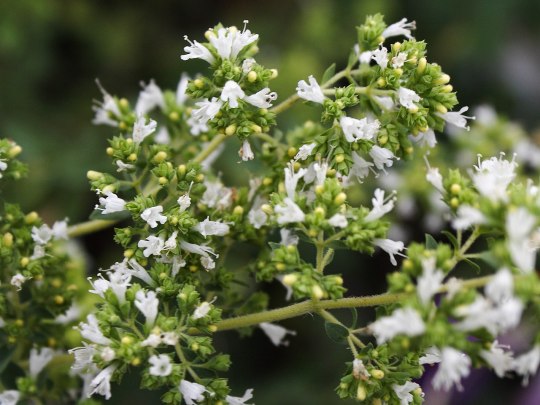


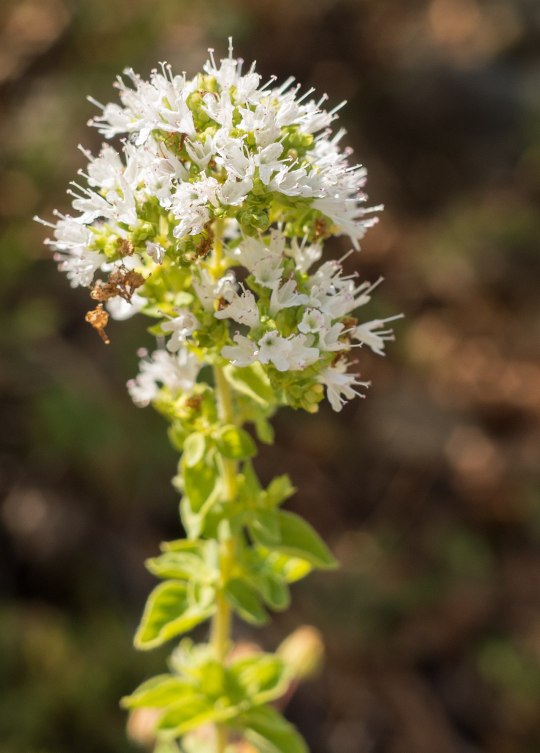
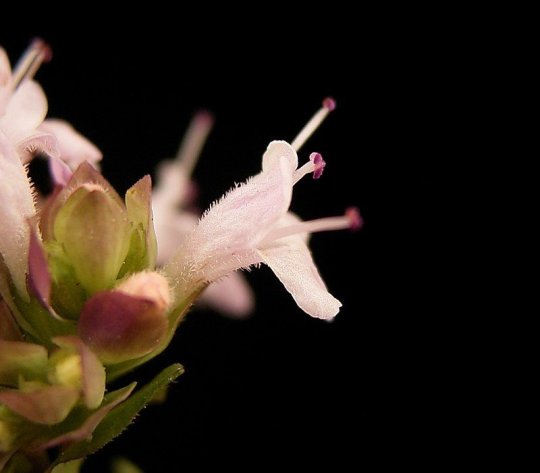
3 notes
·
View notes
Text
Glioblastoma Multiforme Treatment Market is set for a Potential Growth Worldwide: Excellent Technology Trends with Business Analysis
Latest added Glioblastoma Multiforme Treatment Market research study by Archive Market Research offers detailed outlook and elaborates market review till 2030. The market Study is segmented by key regions that are accelerating the marketization. At present, the market players are strategizing and overcoming challenges of current scenario; some of the key players in the study are Merck & Co., Inc.,Amgen, Inc.,F. Hoffmann-La Roche Ltd.,Pfizer Inc.,Teva Pharmaceutical Industries Ltd.,Sun Pharmaceutical Industries Ltd.,Arbor Pharmaceuticals, LLC,Amneal Pharmaceuticals,Karyopharm Therapeutics, Inc.,Sumitomo Dainippon Pharma Oncology, Inc. (Boston Biomedical, Inc.) etc. Click for Free Sample Report + All Related Graphs & Charts https://archivemarketresearch.com/report/glioblastoma-multiforme-treatment-market-2996/sample-report The Glioblastoma Multiforme Treatment Market size was valued at USD 2.67 billion in 2023 and is projected to reach USD 5.10 billion by 2032, exhibiting a CAGR of 9.7 % during the forecasts period. The latest edition of this report you will be entitled to receive additional chapter / commentary on latest scenario, economic slowdown and COVID-19 impact on overall industry. Further it will also provide qualitative information about when industry could come back on track and what possible measures industry players are taking to deal with current situation. Each of the segment analysis table for forecast period also high % impact on growth. The Global Glioblastoma Multiforme Treatment segments and Market Data Break Down are illuminated below: {"Treatment: Radiation Therapy",Immunotherapy}
Have Any Questions Regarding Global Glioblastoma Multiforme Treatment Market Report, Ask Our Experts@ https://archivemarketresearch.com/report/glioblastoma-multiforme-treatment-market-2996/enquiry-before-buy This report will give you an unmistakable perspective on every single reality of the market without a need to allude to some other research report or an information source. Our report will give all of you the realities about the past, present, and eventual fate of the concerned Market. Thanks for reading this article, we can also provide customized report as per company’s specific needs. You can also get separate chapter wise or region wise report versions including North America, Europe or Asia.
More Reports:
https://archivemarketresearch.com/reports/glioblastoma-multiforme-treatment-market-2996 https://archivemarketresearch.com/reports/us-microfluidics-market-2234 Contact US : Craig Francis (PR & Marketing Manager) Archive Market Research Unit No. 429, Parsonage Road Edison, NJ New Jersey USA – 08837 Phone: +1 201 565 3262, +44 161 818 8166 [email protected]
0 notes
Text
Global Leigh Syndrome Treatment market is Estimated to Witness High Growth Owing to Increasing Disease Awareness
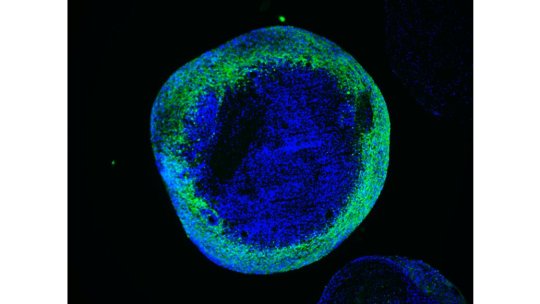
The global Leigh syndrome treatment market is expected to exhibit significant growth due to rising prevalence of the rare genetic disorder. Leigh syndrome is a rare and aggressive neurological disorder caused by mutations in mitochondrial DNA or nuclear genes involved in mitochondrial biogenesis and respiration. The characteristic symptoms of Leigh syndrome include developmental delay, loss of motor skills, weakness, vision problems, and respiratory issues. Currently, there is no definitive treatment for Leigh syndrome. Treatments mainly focus on managing symptoms by targeting the underlying cause. Therapies primarily include vitamin and nutritional supplements, physical and occupational therapy, and medications targeting respiratory and neurological complications.
The global Leigh syndrome treatment market is estimated to be valued at US$ 272.9 million in 2024 and is expected to exhibit a CAGR of 6.7% over the forecast period from 2024 to 2031. Key Takeaways Key players operating in the Global Leigh Syndrome Treatment Market Growth are Abliva AB, PTC Therapeutics, VAKS Pharma, MITOCH, Medley Pharmaceuticals Ltd., Khondrion BV, OMEICOS THERAPEUTICS GMBH. , Edison Pharmaceuticals, Inc. , Dainippon Sumitomo Pharma Co. Ltd., Taysha GTx, PicnicHealth (AllStripes), Takeda Pharmaceutical Company , Biogen, Ionis Pharmaceuticals, Inc., Sarepta Therapeutics, Inc., and MECOSON LABS PRIVATE LIMITED. The global Leigh syndrome treatment market is expected to witness lucrative growth opportunities due to increasing research funding for rare disease drug development and growing orphan drug designations. Furthermore, advancements in understanding the genetics and underlying mechanisms of Leigh syndrome are likely to aid the development of novel targeted treatment options. Key players are actively focusing on expanding their geographical presence through collaborations and partnerships with regional healthcare providers to cater to the growing patient population worldwide. For instance, in 2021, Khondrion partnered with Taysha Gene Therapies to accelerate the clinical development of KH-176, a gene therapy drug candidate for Leigh syndrome. Market Drivers The primary driver propelling the global Leigh syndrome treatment market growth is increasing disease awareness driven by advocacy programs by patient support groups such as United Leukodystrophy Foundation and Cure Sanfilippo Foundation. Growing government efforts to provide orphan drug incentives and streamline the approval process for rare disease drug candidates are also expected to encourage pharmaceutical companies to invest in Leigh syndrome drug R&D.
Get More Insights On This Topic: Leigh Syndrome Treatment Market
#Leigh Syndrome Treatment Market#Mitochondrial Disease#Neurological Disorders#Rare Diseases#Genetic Disorders#Pediatric Neurology#Metabolic Disorders#Pharmaceutical Industry#Drug Development
0 notes
Text
Gekirock interview (July 2017)
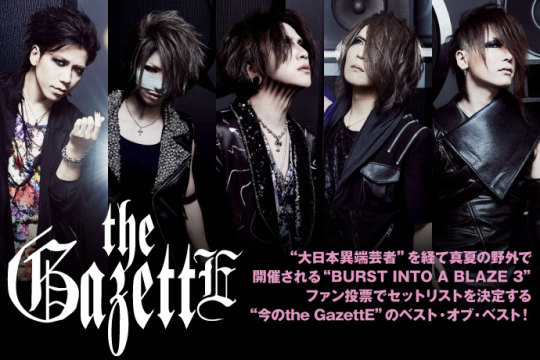

Through "Dainippon Itan Geisha" and into the summer outdoor live, "BURST INTO A BLAZE 3": Featuring a fan-voted setlist showcasing "The Best of the Best" of the current GazettE!
After completing the additional performance of their 15th-anniversary commemorative show Dainippon Itan Geisha ‘Bou Dou Ku Gudon no Sakura’ and wrapping up the HERESY LIMITED TOUR17, the GazettE is set to host their first large-scale outdoor concert in nine years, "BURST INTO A BLAZE 3" on August 19. They’ve also announced their participation in ROCK IN JAPAN FESTIVAL 2017.
In this interview, we explore the plans for "BURST INTO A BLAZE 3," dive into the much-talked-about RAD MARKET merchandise—praised for its outstanding style amid increasingly fashion-forward band merch—and hear advice from the members, who continue to command tremendous support 15 years into their career. We also discuss their thoughts on the media and advice for the next generation.
Interviewer: You’ve just wrapped up the live house tour, HERESY LIMITED TOUR17. How was it? Do you feel like your performances have become more refined?
RUKI: Hmm… Honestly, it was a while ago, so I don’t remember much (laughs).
Uruha: It’s only been two months (laughs).
Interviewer: When I watched your performance at the Yoyogi National Gymnasium First Arena (March 10), I noticed some attendees seemed a bit unsure of how to vibe with the show. Did you feel like the fans got more used to it over time?
RUKI: By the time they were getting used to it, the tour was already over.
Interviewer: The songs from your early "Itan" era have a different approach compared to your louder, more rock-driven tracks. When performing those older songs, what do you consciously focus on? I imagine the challenges are on a different vector as well. With louder tracks, I feel like the vertical axis (the beat and rhythm) is dynamically emphasized. In contrast, the songs from the "Itan" era have a sharper, more edgy atmosphere and seem to require more meticulous expression. What are your thoughts on this, Kai?
Kai: For us, it doesn’t feel like the two are polar opposites, but the older tracks have their own charm. I focused on how to interpret and express those older songs in a way that fits who we are now. I’ve never really thought of it as "this is how we are now, and that’s how we were then."
Interviewer: So, would you say you were able to play them naturally?
Kai: Yes, I think so. Surprisingly, it came together quite smoothly.
Interviewer: What about you, Aoi?
Aoi: With our recent loud songs, there’s often a balance to maintain with sequences, and they’re primarily built around riffs and power chords. But with the older tracks, the phrases had a much wider range. That’s completely different from what we do now, so it felt nostalgic in a way—like, "Oh, it’s been a while since I’ve played these kinds of phrases." Still, since those phrases came from me originally, it felt like I was able to enjoy them together with the audience.
Interviewer: The anguished guitar on "Sugar Pain" (from the 2005 mini-album Gama) left a strong impression. It was amazing.
Aoi: Thank you very much.
Interviewer: What about you, Uruha?
Uruha: The loud tracks we’ve been playing up until recently involved a playing style that focused on locking in with the rhythm. The guitar parts were largely written with an emphasis on how to make the rhythm sound powerful. But with the older songs, there were more floating, cutting-style riffs. Personally, I found the groove much harder to grasp with those.
Interviewer: The rhythms are quite unique and unconventional, aren’t they?
Uruha: Yes, that’s true. The guitar parts often feel detached from the drums, with many floating, upper-layer melodies. In our recent songs, we tend to focus on syncing with the drums, which makes the live performance experience feel significantly different.
Interviewer: It really highlighted the unique pleasure of a visual kei-style twin guitar setup, something distinct from the typical loud rock twin guitar arrangement.
Uruha & Aoi: Thank you very much.
Interviewer: What about you, REITA?
REITA: During the DOGMA era (from their 8th album released in 2015), we were mostly tuning to A or B. We hadn’t played in standard tuning or even a whole step down for a long time, so it was quite challenging to adjust. When you’re in A or B tuning, the looseness of the strings creates this specific low-end resonance. But with standard tuning, you lose that effect. Since the bass drum’s tuning and tone remain the same, I had to figure out how to compensate for that low-end depth, which was tricky. Plus, these older songs aren’t as focused on tight, vertical synchronization as the louder tracks, so while playing them, it sometimes felt like the performances weren’t locking in perfectly (laughs). That kind of frustration lingered a bit.
Interviewer: I see. Unlike loud tracks where the synchronized vertical rhythm stands out, it might have been a bit harder for the audience to catch the rhythm and fully vibe with it.
REITA: Yeah, that could be it. We even adjusted a few songs to make them easier to follow.
Interviewer: Personally, I found that elusive quality fresh and very cool. What about you, RUKI?
RUKI: Comparing now to back then, it’s like two completely different things. The way we perceive and create sound is completely different. Nowadays, we make music by changing the key to suit the situation. Back then, we had songs where the lyrics would be like this, but the music would be like that... Performing them now, I felt it highlighted what we do well today. It also brought flashbacks of our old selves, so I'm glad we went for it.
Interviewer: Let’s talk about the upcoming outdoor live show, LIVE IN SUMMER 17 "BURST INTO A BLAZE 3", scheduled for August 19 at Fuji-Q Highland’s Conifer Forest. It’s your first large-scale outdoor concert in nine years and the third one overall. The trailer mentions the theme of "liberation from darkness." Does that symbolize a desire to simply enjoy being outdoors?
Aoi: Yes, we want to enjoy the outdoor setting. That said, I’m a bit worried about the weather because last time, it rained.
Interviewer: Was it a heavy downpour?
Aoi: No, just light rain...
RUKI, Uruha, REITA, & Kai: (laughs)
Aoi: If it’s going to rain, it should just pour already. A light drizzle doesn’t even make for a good story (laughs).
Interviewer: I see. Light rain isn’t quite legendary material (laughs).
Aoi: If it had been a torrential downpour, we could’ve said, "That day was insane!" or something (laughs). I hope we can make it a memorable live this time.
Interviewer: I’ve never been to Conifer Forest before. What’s the atmosphere like?
Aoi: It’s really in the mountains. It’s located beside or behind Fuji-Q Highland, and from the stage, I remember there was nothing but mountains beyond the embankment.
Kai: It’s basically a forest.
Interviewer: A forest—does that mean it has an outdoorsy atmosphere?
RUKI: Not really. It’s closer to feeling like a sea of trees (laughs). There’s no outdoorsy or lighthearted feel to it.
REITA: Yeah, it’s not exactly "pop" in atmosphere (laughs).
Interviewer: Oh, I see. Since it’s a venue where many artists perform, I thought it might have a more cheerful ambiance.
RUKI: I think when the crowd is there, it might feel that way.
Interviewer: In the second-floor clubhouse, there will be an archive gallery titled "EXUVIA", displaying past costumes, ESP guitars and basses, YAMAHA drums, and more. It sounds like an impressive and extensive exhibit.
Aoi: Yeah, since the space is limited, we’re aiming to show as much as we possibly can.
Interviewer: How big is the space?
RUKI: It’s reasonably large. It’s comparable to a venue where you might hold a big wedding reception.
Interviewer: I recently attended David Bowie’s major retrospective, and even just seeing the costumes was captivating. Given the GazettE’s dedication to costumes, this exhibit feels like something special and invaluable for fans.
RUKI: Putting together this archive exhibit made me realize we need to take better care of the items that represent our history as a band. We should preserve them properly (laughs).
Interviewer: I imagine it will get very crowded. Are there plans in place to manage that?
Aoi: Yes, visitors will have a set time to view the exhibit. I think the staff will handle that part efficiently.
Interviewer: Like your Yoyogi National Gymnasium performance Dainippon Itan Geisha, the setlist for this concert will also be decided by fan voting. The initial rankings had "INSIDE BEAST" at number one, followed by "Filth in the beauty," "TOMORROW NEVER DIES," "Cassis," and "Hyena." Have there been any changes in the rankings since then?
REITA: There have been some slight changes. One or two songs shifted, and I think "VORTEX" climbed higher. Ultimately, singles and more well-known tracks—if I can put it that way—tend to rise to the top.
Interviewer: Did you vote this time as well?
RUKI: Yes, I did. But the song I voted for ranked pretty low. It’s a bit pathetic, isn’t it? (laughs)
Interviewer: Aoi, did you vote?
Aoi: What?! No! Why would I vote? (laughs)
RUKI, Uruha, REITA, Kai: (burst into laughter)
REITA: Because you want to (laughs).
Aoi: But it’s us who decide the setlist! That’s like tipping the scales, isn’t it? (laughs)
REITA: I know, but still... I just kind of wanted to see what would happen if I voted (laughs).
Aoi: Ah, I see. In that case, I might try voting next time (laughs).
Interviewer: How did you feel when you saw the rankings?
Kai: Lately, the songs we’ve been performing in live shows before Dainippon Itan Geisha tend to rank higher, and that makes me happy. Having tracks like "INSIDE BEAST" and "TOMORROW NEVER DIES" near the top is a good sign since they’ve become live staples.
RUKI: Yeah, it’s definitely a good trend.
Interviewer: The details for the merchandise to be sold at the concert haven’t been announced yet, but RUKI, the designs you create for RAD MARKET’s goods are always incredibly cool. I was blown away by the T-shirts from the Dainippon Itan Geisha concert, especially the use of the word "ANTITHESIS."
RUKI: ANTITHESIS means "the opposite". The new designs are going for a more sporty vibe.
Interviewer: One standout feature of your designs is that they aren’t just for live shows—you’d want to wear them casually, too. They don’t just scream the band logo across the front. Is there anything in particular you focus on when designing?
RUKI: I try to incorporate whatever trends are popular at that time. It’s something we won't be able to do next year.
Interviewer: Honestly, they look cooler than T-shirts from some high-end brands that cost ¥30,000.
RUKI: (laughs) Well, men’s clothing can get really expensive.
Interviewer: If you were to wear your own band’s merchandise, like a T-shirt, what kind of design would you want?
RUKI: It depends. The challenge is how to make a typically “uncool” band T-shirt look stylish (laughs). Even with foreign bands’ merchandise, there are some shirts that are hard to wear out, you know?
Interviewer: Like what, for example?
RUKI: Like those of recent bands. I can wear Sex Pistols, but… (laughs).
Interviewer: I think I kind of understand what you mean (laughs).
RUKI: It’s the kind of thing that becomes cool again over time. Stuff like vintage 1980s L.A. metal shirts—METALLICA or MÖTLEY CRÜE—those are wearable. It’s about wearing something that’s a bit ironically uncool.
Interviewer: Ah, that makes sense!
RUKI: Like IRON MAIDEN shirts. Those are kind of unfashionable, aren't they (laughs).
Interviewer: Yeah, they’ve got that subtle pop charm. I’ve even seen black rappers like Tyler, The Creator rocking MAIDEN shirts, and it looks surprisingly fresh. It’s become a thing for rappers to wear metal T-shirts, hasn’t it?
RUKI: Yeah, it’s definitely a trend. Apparently, there’s this whole market where vintage band T-shirts sell really well because American rappers and celebrities wear them. Some people are making a fortune selling super vintage stuff to them—it’s become this huge trend (laughs).
Interviewer: The shirt you’re wearing today is a Kendrick Lamar T-shirt, right? It’s super cool. I don’t think you can find that in Japan yet. Where did you get it?
RUKI: Yep, it is. But where I got it is a secret (laughs).
REITA: "DAMN."!
Aoi: What’s that? A band?
RUKI: He’s a rapper.
Aoi: I don’t have that kind of taste like RUKI does, so I don’t really wear band shirts much, except maybe the GazettE ones. But when I wear them to work, I end up matching with the other members (laughs). So I stopped wearing them, but now they’re the ones matching, and I’m like, “Come on!” (laughs). Privately, though, I still wear them. Oh, that reminds me—ages ago, I went to see EXTREME live and bought a T-shirt as a souvenir for RUKI. But I’ve never seen him wear it (laughs).
RUKI: It’s safely tucked away in my collection (laughs).
Aoi: In the unfashionable section (laughs).
RUKI: No, no, it’s great (laughs).
Kai: I’ve never bought a band T-shirt myself, so I wouldn’t know. But if I did, I’d probably focus more on the design than the logo.
REITA: A while ago, I was looking for a MÖTLEY CRÜE shirt. But the ones I wanted were crazy expensive—like *¥30,000 because they’re vintage. And the ¥3,000 ones just didn’t appeal to me.
*¥30,000 ≈ €184
Interviewer: I kind of get what you mean.
REITA: Still, spending ¥30,000 on a T-shirt feels ridiculous, so I didn’t buy it in the end.
Interviewer: Do you think 30,000 yen is too much for a T-shirt?
REITA: Of course! It’s expensive, isn’t it? (laughs)
Aoi: Wait, we’re talking secondhand, right? It's called vintage (laughs).
REITA: Ah, yeah, I guess so.
Aoi: Still, ¥30,000 is too much.
REITA: Right? I’d even hesitate if it were brand new.
Interviewer: I’m looking forward to the new RAD MARKET merchandise announcements. Are the member-produced food items still in development?
RUKI: Yeah, we’re planning to do a taste-testing session soon.
Interviewer: The Fuji-Q live sounds like it’s packed with festival vibes and exciting ideas—I’m really looking forward to it. Also, you recently announced your appearance at ROCK IN JAPAN FESTIVAL. That was a surprise, considering that visual kei bands have only recently started performing at these kinds of events. (the GazettE will perform on August 11th.)
Uruha: Yeah, it’s a completely unknown experience for us. I imagine it’ll have a very different vibe from something like "LOUD PARK" or "KNOTFEST," which makes it exciting. I’m picturing it being somewhat similar to Hokkaido’s RISING SUN ROCK FESTIVAL.
Interviewer: I feel like the so-called “Japanese rock kids” will probably enjoy it pretty openly. Plus, the atmosphere is great—peaceful and relaxed.
Aoi: That makes me feel a little less nervous (laughs).
Interviewer: Going back a bit, how did you feel about your performance at last year’s "KNOTFEST"?
RUKI: Well, we did our best (laughs).
Uruha: I think the audience reaction was better than how I personally felt about it.
Interviewer: In your previous interview (from the March 2017 issue), RUKI mentioned that modern visual kei, with its core in loud rock, seems to have "hit a ceiling." I found that insight to be very sharp. I interviewed a band that has openly expressed their admiration for the GazettE, and they incorporate elements like 7-string guitars, Djent, and progressive styles, with a high level of skill. It made me wonder if that’s the natural direction loud rock evolves toward. I've also spoken with other visual kei bands and even some fans, and I often sense a feeling of insecurity or complex about being associated with visual kei. After celebrating your 15th anniversary, as a leading figure in visual kei and someone who guides future bands, could you offer any advice to those who might feel unable to proudly say they love visual kei or don't feel confident about it?
Aoi: Hmm, honestly, we don’t really care about what others think, so I don’t have any words to offer (laughs). But I think it's good for each person to do their own thing in this scene. In the loud scene, for example, when a certain style becomes popular, like Djent, it just becomes saturated, right? That "follow-the-leader" mentality isn’t necessary, you should just do things your own way and let them fade or evolve however they will.
Interviewer: Loud rock is also starting to settle into certain formulas, but it still manages to endure over time, doesn’t it?
Aoi: But that's not so easy for visual kei. There are people doing their own thing in their own way, and if those people can survive, I think that’s all that really matters.
Interviewer: How about you, Kai?
Kai: Well, I’m not really in a position to say much... but what I think is that there’s something cool about sticking to one style. That’s why I like bands that stick to their style.
Interviewer: Do you mean in terms of their musical style?
Kai: Both, actually. Including their attitude. I don’t really get deeply involved with other bands, so I can only comment from a superficial perspective (laughs).
Interviewer: How about you, REITA?
REITA: If we're talking about the kids who can't feel proud of being part of visual kei, I don’t understand why they can't say it with pride, but I guess that’s just how they feel. That can be a good thing, though. "Visual kei" is a name everyone knows, but not many people are fully immersed in it, and maybe that’s what's good about it. Also, when people say things like, "Visual kei shouldn't be at this kind of festival," that actually makes me more motivated. I think it becomes a driving force.
Interviewer: So, you’re saying that complex feelings can be turned into motivation.
REITA: Exactly.
Interviewer: What do you think, Uruha?
Uruha: I can’t really offer advice, but I think if someone can't proudly say they’re part of visual kei, it's actually proof that they're self-aware, and I think that's pretty smart. We’re doing the core of visual kei, but when we were younger, we were very edgy. In that sense, I think the younger generation is a lot smarter. It doesn't matter what others think—this is a world where no one will guarantee anything for you, so it’s best to just do things the way you like.
Interviewer: What about you, RUKI?
RUKI: Not being able to take pride in visual kei… Well, I guess I don’t really care about anyone else outside of us.
Interviewer: During the live performance at the National Yoyogi venue, you made a declaration to "proudly continue in visual kei," which sounded like a statement of commitment to the visual kei scene.
RUKI: I’m not really interested in visual kei as a "scene." To me, "visual kei" is more like being an inventor—something that encompasses makeup, costumes, packaging, and everything related to visual presentation. So, it really depends on what you mean when you say "visual kei."
Interviewer: I think it’s also about the fact that your background is rooted in the visual kei scene.
RUKI: Visual kei itself has become so subdivided, so we’re just us, and others are just others. That's why I don’t have any advice to offer. Of course, we’re grateful when people say they like our music.
Interviewer: I don't know if it's just coincidence, but almost all the bands I interview or meet in venues say that they've been influenced by the GazettE.
RUKI: What do they say they like about the GazettE? Like the era?
Interviewer: It varies by era, but a lot of them talk about the spirit of the band, and they speak passionately about it. For example, many people thought that visual kei was synonymous with bad musicianship and lack of technical skill. But after attending a live performance, like the "Shikkoku", they realized how good you actually are! They were surprised by not only the skill but also the high level of sound and production. If you actually saw the live show, you wouldn't have any bad feelings, right?
RUKI: I’m grinning, actually (laughs). It really depends on what part of us they like. When people become fans of a band, some of them fall in love after reading an interview, and some after watching a documentary.
Interviewer: You mentioned that some people become fans of a band by reading an interview, but I feel like lately, there are fewer people who develop a liking for a band from reading an interview. Over time, media has changed, and now there are more outlets, especially with the rise of the internet, but the content often feels the same, like the same types of questions being asked. I say this with some self-reflection, and I realize this question might sound strange, but since you’ve given many interviews, do you have any thoughts about the types of questions that get asked?
RUKI: It feels like media has shifted from magazines to the internet, but the questions haven’t really changed since the magazine era. I hate to say it, but the questions I hear from the inner circle, the ones that are specialized in visual kei, aren't very interesting to read. In the past, I was often asked about personal things. But then again, not all fans necessarily want to hear about the music side of things. What people are most interested in is the mindset or the emotional side—what we’re thinking or feeling. Personally, I pay attention to those aspects. For example, interviews with bands that are disbanding are often very awkward, and I find the way that tension comes through quite interesting (laughs). Things like that—a glimpse into the true nature of a band—is what I find interesting.
Interviewer: Do you all read media interviews? What kind of articles are you interested in?
Aoi: When I read band interviews, it's rare for me to get a bad impression of someone.
Interviewer: So, it's usually non-offensive, right?
Aoi: Oh, I see what you're saying (laughs). Well, I don’t really end up disliking anyone after reading their interview, but I’m not particularly drawn to them either. But I think non-offensive, neutral responses are the best.
Interviewer: What about you, Kai?
Kai: Hmm, if it feels like they're just saying ordinary things, I’ll just pass it by (laughs). It’s more common with people who are older, but there are some who say very nasty things, right?
Interviewer: That's certainly true (laughs).
Kai: Whether it's for better or worse, I tend to pay attention to people like that. I end up getting more and more immersed, thinking, "Why did they say that?" "What’s the reason behind that statement?" I find that interesting.
Interviewer: So, you want to know why they said it. How about you, REITA?
REITA: I’m going to say something that might not be the best... but I don’t really read interviews in print. I do like video interviews, though. I enjoy paying attention to how they say things, their tone of voice, the pauses, their phrasing—those are the things I find cool. But when it’s in writing, I find it hard to know how seriously to take it. It’s a bit difficult for me to tell how much of it is genuine.
Interviewer: Hmm... That hits a bit close to home...
Aoi: But sometimes, when (the interviewer) transcribes it, they make the artist sound like they're using a really formal tone, right? (laughs). It makes it sound like they are being really condescending. I'm a bit taken aback by that. Like, "Whoa! I'm not saying that at all!" (laughs).
Interviewer: I see (laughs). How about you, Uruha?
Uruha: Personally, I don’t really read band interviews in magazines. Instead, I read interviews that come with scores. I’m more interested in comments about their performance, the playing itself. I’ve never been that interested in the mental or emotional side of artists.
Interviewer: So, you were originally more interested in the craftsmanship side of things. How about you, RUKI?
RUKI: I don’t really read other people's interviews, but sometimes I do read interviews that show up on my Twitter timeline. They’re often from different genres, and when I read those, I think, "Wow, that's impressive." There are statements where people say things like, "I’ve got nothing left to lose." The lack of responsibility in their statements is so clear, and I really like that.
Interviewer: Yeah, interviews with idols can sometimes be really surprising.
RUKI: That feels like it’s closer to their true nature. Also, I find articles about foreign artists interesting.
Interviewer: For example, Corey Taylor of SLIPKNOT criticizing Donald Trump, although not many media outlets report on that.
RUKI: I really like stuff like that. Trent Reznor from NINE INCH NAILS is really critical of the music industry. He’s a huge name, and even though he’s making his own music with a lot of passion, he says things like the music industry is dead, it’s rotten, and there are no inventors left in the industry. I think it would be amazing if people in Japan were as bold as that. Like, "Sorry, but it’s over!" (laughs). It’s hard to find that kind of honesty in Japan... When it comes to artists, it's about whether they’re going commercial or staying true to their art. Watching how that unfolds is really interesting.
Interviewer: I’ll take that to heart. I've always felt that things that are inoffensive are less likely to catch on to people other than fans.
RUKI: Yeah, album interviews are usually the least interesting (laughs). Part of it is the times we’re in. Back in our day, there was a certain thrill in digging deeper into things like spirituality—or the deeper mindset behind what they were saying—or not saying.
Interviewer: These days, you can usually look everything up online right away. I also feel that the GazettE is really good at using social media, but at the same time, it must be difficult. Are there things you’re careful about when it comes to social media?
RUKI: I try not to say things as if I’m always right, though it’s not like I actively remind myself to do that. I just try to avoid saying unnecessary things, since there are so many different people out there.
Interviewer: It’s a tough situation, right? Especially for famous people, who are under so much pressure regarding compliance these days. I’ve noticed, although this doesn’t involve the GazettE specifically, that on social media, there’s a never-ending debate among live kids about live manners. I often think it's pointless.
RUKI: I used to be the type to speak up about live manners. I don’t do it much anymore, though. Back in the day, if something came up, I would write long posts about it.
Interviewer: Do you have any thoughts when you see debates about live manners?
RUKI: Since I’ve been the one to bring it up in the past, I kind of feel like, "Can’t people just enjoy things normally?" I do think people should be more mindful. Sometimes, you have to say things strongly for them to be understood.
Interviewer: I sometimes think that maybe these things can only be solved by not engaging in debates at all.
RUKI: Hm... I wonder if it’s because of the way society has shifted that things have turned out this way.
Interviewer: From a fan’s perspective, what the members say is absolute, right? So, maybe instead of vague statements about manners, it would be better if the band clearly set some rules.
RUKI: That's right, it’s the same for every band. If you don’t want to cause trouble, then don’t say anything. But if you’re okay with causing trouble, then go ahead and say it. I think it’s tough for bands playing in live houses, though. The places where we always have trouble are live houses, too.
REITA: I think it’s because we also play in halls.
RUKI: Right. So this problem will probably continue forever.
Interviewer: But it’s a bit contradictory, isn’t it? Going to a live show is a positive experience, and you’re basking in the afterglow, but then you open social media, you might see something like, "There were people with bad manners!"
REITA: That's really unpleasant, isn't it? I don’t understand the idea of trying to make everyone know about someone. If it’s about a specific person, just tell them directly.
RUKI: REITA has spoken (laughs)!
12 notes
·
View notes
Text
Global Chronic Obstructive Pulmonary Disease (COPD) market: A Deep Dive into Key Drivers and Trends
The worldwide market for Chronic Obstructive Pulmonary Disease (COPD) is anticipated to reach a substantial valuation of US$21.58 billion in the year 2023. As a consequence of the rising prevalence of alcohol consumption among individuals, the collective requirement for Chronic Obstructive Pulmonary Disease (COPD) is expected to experience a significant expansion, manifesting a commendable Compound Annual Growth Rate (CAGR) of 4.4% during the period from 2023 to 2033. By the conclusion of the year 2033, the market is forecasted to achieve an impressive total worth of approximately US$33.19 billion.
Claim your complimentary report with captivating visuals. Get Sample PDF https://www.futuremarketinsights.com/reports/sample/rep-gb-16215
Additionally, the World Health Organization (WHO) states that the most common cause of COPD is exposure to tobacco smoke both via first hand as well as second-hand smoking. This global increase in the prevalence of COPD is a major factor fueling the growth of the COPD market in the forthcoming years. In addition, the rise in consumption of tobacco among millennials, coupled with the rise in the awareness among population, regarding the use of generic drug are projected to contribute to the revenue share of the chronic obstructive pulmonary disease market in the near future.
According to the Centre for Disease Control and Prevention (CDCP), the cost related to COPD in the US were 32.1 $ billion in 2010, and rose to 49 billion by 2020. Hence, the continual growth witnessed in the cases of COPD among population worldwide is a major factor that will intensify the growth of the COPD market over the forecast period.
Key Takeaways from the Market Study
Global Chronic Obstructive Pulmonary Disease (COPD) Market was valued at US$ 20.67 Billion by 2022-end
From 2018 to 2022, the market demand expanded at a CAGR of 2.4%
By Type, the Chronic Bronchitis segment of the market constitutes the bulk of the market with a market share of 43%
By Distribution Channel, the Retail Pharmacies segment dominates the market with a share of 42%
From 2023 to 2033, Chronic Obstructive Pulmonary Disease (COPD) sales are expected to flourish at a CAGR of 4.4%.
By 2033, the market value of Chronic Obstructive Pulmonary Disease (COPD) is expected to reach US$ 33.19 Billion.
Click Here for the Exclusive Discount. Contact us for Discount https://www.futuremarketinsights.com/request-discount/rep-gb-16215
Continual increase in cases of COPD globally, coupled with rising cases of tobacco consumers are the major factors escalating the growth of the Chronic Obstructive Pulmonary Disease (COPD) market in the near future, remarks an FMI analyst.
Competitive Landscape
Prominent players in the Chronic Obstructive Pulmonary Disease (COPD) market are Almirall, AstraZeneca, Boehringer Ingelheim International GmbH, CHIESI Farmaceutici S.p.A., F. Hoffmann-La Roche Ltd., GlaxoSmithKline plc., Kyowa Hakko Kirin, Mylan N.V., Novartis AG, Orion Corporation, Sanofi, Sunovion Pharmaceuticals, Inc. (Sumitomo Dainippon Pharma Co., Ltd.), Teva Pharmaceutical Industries Ltd., Theravance Biopharma, and Verona Pharmaceuticals, among others.
Recent Developments:
In June 2022, Verona Pharma, a pharmaceutical company, announced completion of the patient enrolment, with more than 800 subjects involved for its randomized ENHANCE-1 trial. The study will evaluate ensifentrine for the maintenance treatment of chronic obstructive pulmonary disease. It is a critical step for the phase III ENHANCE trial with top-line data expected by the end of the year 2022 and further data from ENHANCE-2 in the third quarter of 2022.
In May 2022, Alembic Pharmaceuticals Ltd, a pharmaceutical company, received final approval from the US health regulator for its generic version of Arformoterol Tartrate inhalation solution indicated for long-term treatment of bronchoconstriction in patients with chronic obstructive pulmonary disease. The approval by the U.S. Food & Drug Administration (USFDA) for the abbreviated new drug application (ANDA) for Arformoterol Tartrate inhalation solution is for strength of 15 mcg (base)/2 mL unit-dose vial.
Ignite Change: Get Your Customized Impactful Report Now! https://www.futuremarketinsights.com/customization-available/rep-gb-16215
0 notes
Text
Prosthetics and Orthotics is Estimated to Witness High Growth Owing to Rising Number of Road Accidents

Prosthetics refer to artificial limbs that replace missing parts of the body, while orthotics are devices used to support weak or ineffective joints or limbs. Prosthetics and orthotics include medical devices such as braces, supports, spinal orthotics, braces, dental braces and more. They are used to treat problems related to any part of the body ranging from legs, arms, back, dental to spine. With growing number of accidents and injuries requiring replacement or support to joints and bones, the demand for prosthetics and orthotics devices is on the rise. The global prosthetics and orthotics market is estimated to be valued at US$ 6923.2 Mn in 2023 and is expected to exhibit a CAGR of 9.3% over the forecast period 2023 to 2030, as highlighted in a new report published by Coherent Market Insights. Market Dynamics: Rising number of road accidents remains a key driver fueling growth of the global prosthetics and orthotics market size over the forecast period. As per the WHO estimates, over 1.35 million people die in road accidents each year globally. Such accidents often lead to loss of limbs and cause injuries requiring prosthetic or orthotic support. Thus, growing cases of road accidents and injuries are expected to drive demand for prosthetics and orthotics. Another major driver is increasing prevalence of diabetes globally. Diabetes patients are highly prone to developing wounds, injuries and infections in lower limbs often requiring amputation. This in turn is expected to propel market growth over the forecast period. According to International Diabetes Federation estimates, over 537 million adults were living with diabetes in 2021 globally, with number projected to rise to 643 million by 2030 and 784 million by 2045. SWOT Analysis Strength: Prosthetics and orthotics can help improve mobility and quality of life for patients suffering from limb loss or musculoskeletal disabilities. Advanced biomaterials used for prosthetic components are lightweight and durable. Many insurance providers offer coverage for prosthetic devices and services. Weakness: The costs associated with advanced prosthetics and custom-made orthotics can be very high. Not all insurance plans provide full coverage. Certain disabilities may not have viable prosthetic solutions. Opportunity: Rising incidences of trauma injuries, diabetes, and vascular diseases are increasing the demand for prosthetics and orthotics globally. Growing geriatric population prone to mobility issues widens the potential market. Technological advances may lead to more affordable and effective solutions. Threats: Stringent regulatory approvals and medical standards delay the launch of new products. Intense competition from local and global players increases pricing pressures. Economic slowdowns can negatively impact the discretionary spending on such devices. Key Takeaways The global prosthetics and orthotics market is expected to witness high growth over the forecast period of 2023 to 2030.
Regional analysis: The Asia Pacific region offers immense growth opportunities for prosthetics and orthotics manufacturers. Countries like China, Japan, and India have a huge population suffering from disabilities. The growing medical capabilities and healthcare infrastructure in these countries are attracting medical tourists. Additionally, governments are raising awareness about advanced rehabilitation solutions and offering subsidies to make them more affordable. Key players operating in the prosthetics and orthotics market include Applied Materials, Inc., ASML Holding, Canon, Tokyo Electron, Lam Research, KLA-Tencor, Dainippon Screen, Advantest, Teradyne, and Hitachi High-Technologies. These companies are focusing on developing customized prosthetic components using lightweight 3D printed materials and myoelectric sensors for better mobility. Partnerships with healthcare providers and investments in R&D are helping them expand globally.
Get more insights on this topic: https://www.newswirestats.com/prosthetics-and-orthotics-market-size-and-outlook/ Explore more information, Please visit:https://filmik.in/cell-therapy-harmonizing-hope-through-the-therapeutic-rhythm-of-cellular-alchemy/
#Prosthetics And Orthotics#Prosthetics And Orthotics Market#Prosthetics And Orthotics Market size#Prosthetics And Orthotics Market share#Coherent Market Insights
0 notes
Text
Samsung Display plans to list non-FMM medium-sized OLED as the next issue

【Lansheng Technology News】Samsung Display’s next task will be to use the semiconductor exposure process instead of FMM’s “non-FMM” method of OLED. Since the SID exhibition in May this year, Samsung Display’s internal attention to non-FMM OLED has continued to increase. This is because non-FMM OLEDs may be used to fill the technology gap between small and medium-sized RGB OLEDs and large-sized QD-OLEDs that are difficult to expand the market. It is predicted that non-FMM OLED will promote the development of the medium-sized OLED market for multi-variety small-volume production products.
Samsung Display's next task will be medium-sized organic light-emitting diodes (OLEDs) using a "non-FMM" method that does not use fine metal masks (FMM).
FMM is currently used for vacuum evaporation of red (R), green (G), blue (B) and OLED sub-pixel components in small and medium-sized products such as smartphones. OLEDs currently used in smartphones and smartwatches use FMM to evaporate RGB OLED sub-pixels adjacent to each other on the same layer. Japan's DNP (Dainippon Printing) Company is the leading manufacturer in the FMM market.
The MM must be made into a long stick-shaped FMM. In order to prevent the center part of the FMM stick from sagging downward, it needs to be stretched and welded to the large frame. At this time, if the Sitck width is widened, it will be difficult to tighten the FMM. Because of this, there is a problem that makes FMM production more difficult. It is currently known that the FMM production yield of 6-inch smartphone OLED is at the level of 30%, but as the screen becomes larger, the production yield will inevitably decline further.
It is understood that considering the width of the mass-produced FMM Stick, the OLED screen size limit that can be made into a standard screen is 15 to 17 inches. The screen sizes of OLED laptops released by Samsung Electronics and LG Electronics are also around 13 to 17 inches. Although there are many automotive displays over 30 inches, these products are narrow and thin, so the FMM Stick does not need to be significantly wider.
Samsung Display's QD-OLED and LG Display's white light (W)-OLED are being applied in the field of OLED displays and OLED TVs without using FMM and using open metal masks (OMM). These large-size OLEDs produce blue light (QD-OLED) or white light (W-OLED) by stacking 3 to 4 light-emitting layers, and then achieve this through a QD color conversion layer (QD-OLED) or a color filter (W-OLED) color. The light-emitting layer of this method has 4 layers (QD-OLED) or 3 layers (W-OLED), so the power consumption is high and the brightness improvement is limited.
As far as OLED is concerned, RGB OLED using FMM can be used for 15 to 17 inches, and large-size OLED can be used for 30 to 40 inches and above, but there is a technical gap between 17 inches and 30 inches. The reason why non-FMM OLEDs have attracted attention is due to the limitations of FMM RGB OLEDs and the gaps in OLED technology.
Lansheng Technology Limited, which is a spot stock distributor of many well-known brands, we have price advantage of the first-hand spot channel, and have technical supports.
Our main brands: STMicroelectronics, Toshiba, Microchip, Vishay, Marvell, ON Semiconductor, AOS, DIODES, Murata, Samsung, Hyundai/Hynix, Xilinx, Micron, Infinone, Texas Instruments, ADI, Maxim Integrated, NXP, etc
To learn more about our products, services, and capabilities, please visit our website at http://www.lanshengic.com
1 note
·
View note